Awesome Nuts & Chews
Trish pursed her lips and blew a long, thin plume of cigarette smoke out her bathroom window. She didn’t mind having to hide the smoking. In fact, she was pleased her children had been so brainwashed by the nuns. Cigarettes, booze, blow — it was all the same to them.
Outside the day was bright and silent, the rural street blanketed with snow. Carly, the baby, was asleep in her crib. John Michael, age 11, and the twins, 8, were out selling holiday candy for their school. She disliked these fundraisers even more than the bake sales and wreath sales. There was something indecent about children selling door-to-door. But her opinion carried no weight. At St. Michaels, the candy sale was a fact of life. Treats & Treasures, Season’s Delights, Holiday Cheer; cheap candy, fancy boxes, the same as she’d once sold.
Mayhem erupted all at once, Carly shrieking to get her out of her crib, the three boys yelling and pounding on the back door. Trish tightened the drawstring of her sweatpants, threw the half smoked cigarette in the toilet and flushed.
She scooped her 2½-year-old daughter up from her crib. Five years after she’d thought she was through having babies, then along came Carly. The thought of having another child horrified her. But Kevin dreamt it would be a girl and told her “God has his ways.”
She changed Carly’s diaper, trotted downstairs with Carly planted on her hip, and opened the door. The boys exploded into the kitchen. Under their woolen caps, they all had the same small diamond-shaped face as Trish, the same dark eyes shot with streaks of green. Carly was fairer, blonder, fleshier, like her father.
“Don’t you dare come any further with those wet snow boots,” said Trish, pining for the next cigarette.
At five-thirty, her husband, Kevin, manager and part owner of the Friendly’s in town, strolled in. When Mork & Mindy ended everyone headed for the dining room table: Kevin at the head, Carly and Sean on one side, John Michael and Lucas on the other. Trish served meatloaf and potatoes swimming in thick brown gravy. The children had plastic cups of milk. Kevin had Mountain Dew; Trish, her bottle of Perrier.
“I don’t want meatloaf. It looks like dog food,” said Lucas.
“It’s delicious,” said Kevin, raising his fork to his mouth. “Your mother is a wonderful cook.” When Trish got up to get the ketchup and white bread, he patted her on the rear end. She turned, ready to scowl, but his round baby-soft face and playful eyes made it impossible for her to be annoyed. The meal progressed with finger pointing and name-calling while Trish doled out the warnings.
“You know my cousin Eddie, the one who lived in Essex?” said Kevin. Kevin had hundreds of cousins. “The one with the earring. He called me. He lives in New York now, got a job at MTV. They’re having some sort of blowout Christmas party and he wants us there. To give him moral support, I guess. Anyway, I said okay.”
“You hate New York, Kevin,” said Trish, unable to ignore a stirring in her blood, a rich soft wanting of her past.
“I figured you’d be thrilled. Kevin smirked. “Hey, wouldn’t it be a hoot if we ran into Ethan?”
“That’s ridiculous, Kevin. There are ten million people in New York.”
“He’s some kind of famous sound engineer, isn’t he?”
She hoped her face wasn’t as red as it felt. Kevin got a kick out of teasing her about her first marriage. The little he knew about the time she’d spent in New York with Ethan titillated him. She suspected he was secretly proud of having a wife with such a thorny past.
“Who’s Ethan?” said Sean.
“Never mind. You have two peas left,” snapped Trish.
“Will you buy some candy from me?” said John Michael, breaking the silence.
“What are you selling?” asked Kevin.
John Michael whipped the brochures out from under his seat.
“And me,” shouted Carly, tipping over her cup of milk onto Lucas.
“Whoa!” shouted Lucas. Kevin sprang up for a dish towel and winked at Trish.
She scanned the brochure absentmindedly. How ironic, that the love pats and winks that first attract you to someone, inevitably become the gestures you dislike the most, thought Trish.
“I’ll take the Awesome Nuts & Chews,” she said with a weary smile.
They’d been married for 12 years. Trish had come back from New York to Wellsboro, devastated by her failed marriage, and there was Kevin, smiling in a doorway. He called her his ex-actress, Trish the Dish. They’d dated in high school. Even then, he didn’t make the earth move, but he was comfortable and dependable. A year after her return, she was married in the blue steeple church where she’d once taken communion. Within five years they had three boys. They moved into a sage green shingled colonial on a windy country road, two miles from her parents, three from his. She drove the station wagon; he, a tomato-red Mazda. Eventually the memories of her days in New York and the late nights got folded away like heavy blankets in spring. She’d packed away Ethan and the divorce until everything from her former life was safely out of sight.
Smoking in the bathroom, Trish mentally flicked through her closet for an outfit. She imagined the floor-to-ceiling windows, tea-lights and top shelf liquor. As the week ground on, the anticipation grew. On the night of the party she shaved her under arms and legs even though Kevin never touched them when they made love. (Five minutes kissing on the mouth, five minutes per breast, and five minutes of rubbing between her legs; he was always on top.) It wasn’t fear but worry that made her keep her resentment of Kevin’s lumpy lovemaking to herself. There were too many more important things at stake. His dignity, her home, their family. She tried on a paisley mini-dress, then a pantsuit with padded shoulders, before settling on a black cocktail dress she’d worn to several cousins’ weddings and her diamond studded cross.
The party was in a loft on Prince Street. Kevin and Trish stood at the open door staring into the darkness. Paper lanterns were strung across the rough wooden beams. Pat Benatar’s voice whined overhead, the sound seeming to emanate directly from the pipes on the exposed ceiling. Yep, thought Trish, Love is a Battlefield.
“Is it safe to go in?’ asked Kevin.
Trish pulled him through the heavy metal door towards two catty-cornered couches piled with coats. Kevin kept his corduroy barn jacket on. Despite the draft rushing in through the casement windows, she laid her scarf and coat onto the heap of clothes. It was when she straightened up that she recognized Ethan sitting on an armchair underneath the row of windows. Her head snapped back towards Kevin. She wanted to look but didn’t dare turn back. She gripped his hand and steered him through the clusters of people towards the back of the room, her heart thudding hard and fast.
“Jeez, it stinks in here,” said Kevin. “Something is killing my eyeballs.” Trish inhaled the pungent Vics Vaporub odor. She led Kevin past a row of chafing dishes on the red and green linen-draped tables to the bar in the corner of the room and asked for a tequila and coke for herself and a Budweiser for Kevin.
“I wonder what that smell was.” said Kevin.
“Poppers,” said Trish, sipping her drink. Kevin’s forehead wrinkled. “Amyl nitrate.”
“Oh,” he said.
Kevin had no idea what she knew or where she’d been before they married. He knew nothing about rooftop parties, the ecstasy, the blow. He thought she left Ethan because of the abortion. Kevin didn’t know Ethan became a different person with each person he met. When Trish became pregnant, four years into their marriage, so much of her love had already been tainted by the booze and dope and their long-standing argument about having a baby. She’d fantasized sticking a pinhole in her diaphragm. Then it happened — the diaphragm failed all by itself. She begged him to keep the baby. He said he would leave her if she didn’t get rid of it. I can’t give you the white picket fence you want, he said. It was when he insisted on the abortion, she realized he was incapable of being an adult.
Trish met Ethan right after she graduated Rosehill College for Women. She’d come to New York with the dream of becoming an actress. The first time she’d spent the night they made love again in the morning and he brought her breakfast in bed, fancy coffee, fresh squeezed juice and a cheesy spinach omelet. She literally skipped across Central Park to get to an audition. She’d never experienced that kind of intensity with anyone, whether they were making love or screaming at each other on the top of their lungs, their passion was absolute.
But she hadn’t known then, that someone who drinks every day and calls it his relaxation, is an alcoholic. One or two was never enough, whether it was Absolut or Tuinols or lines of coke. When Ethan drank, he became another person, loud and self-pitying. He drank the morning he came home from the Lionel Ritchie tour and discovered Trish lying on the couch with warm blood oozing onto the hospital pad between her legs. He hadn’t thought she’d take care of it so quickly. He cried as he drank, saying over and over that he wasn’t good enough for her, banging his head against the wall. It sickened her to watch. She closed her eyes, the cramps bending her in half, reminding her how much she’d wanted that baby. That morning, she let him drink until he blacked out.
“Are you all right?” Kevin said over the blare of Prince’s Little Red Corvette.
“Of course, I’m just checking things out. Another tequila and coke,” she said to the bartender.
“Honey, don’t you think you should slow down?” said Kevin.
“Another, please,” she said, winking at Kevin. “Come on, let’s find Eddie.”
They moved diagonally through the crowd towards the other end of the loft. Trish lit a cigarette. Kevin frowned. A waitress wearing a miniskirt and an MTV Santa cap held out a tray of bacon-wrapped shrimp. Kevin stabbed three with one toothpick. They threaded past a cluster of people getting high, someone held out a joint to Kevin.
“No, thank you,” he said, guiding Trish forward by the waist. “Are all New York parties like this?”
The tequila was starting to mellow her. “Only the good ones,” she said.
Near a side wall, Eddie was holding court. He slapped Kevin on the back and pumped his hand. Trish got an enormous bear hug and a kiss on the lips that lasted just a little too long, reminding her what it was she didn’t like about him. He asked about their kids, the mortgage, the Mazda. Kevin seemed visibly relaxed to be with someone he knew. Trish tossed back her drink and excused herself, Eddie pointing the way to the bathroom.
Out of their view, she lit another cigarette and headed back towards the bar. She was feeling good, but hardly good enough. Tonight she wanted to be a younger version of herself, the hot party girl she hoped she’d been years before when she had married Ethan. And she wanted to glow, for Ethan to know how content she was now.
It wasn’t long before she spotted him again, his back to her, at the opposite end of the food table. Though he no longer had a ponytail, she knew it was him by his short, compact build. His hair was clipped in a crew cut and he wore a tight fitting white T-shirt. A few years ago, she’d found out from a friend she still kept in touch with in New York that he’d given up the drugs and stopped drinking altogether. She also knew from his elderly mother in Albany, whom she still spoke to, that he’d become a health nut. Why not back then, when it would have mattered, she thought.
Trish stared at his back and willed him to turn around, to look at her, still eye-catching, still fun-loving, a mother of four children. A woman glided up to him and slipped her arm around his waist. She was petite and dark haired, like Trish, wearing a sleeveless red dress and thick gold bangles. Trish felt like she’d been hit in the head with a metal swing.
She walked into the bathroom holding her third, or was it her fourth drink? The room reeked of hairspray and smoke. Trish gazed at the women on either side of her, their faces reflected next to her in the mirror, heads tilted up as they painted their eyes. Three other women huddled together by the last sink near the huge window, getting high. Marijuana smoke snaked around her, rising above the stall doors. A woman with a masculine build, pancake makeup and fiery orange hair, turned and handed her a joint. She accepted gratefully, inhaled and closed her eyes. It was potent, smoothing out the heavy alcoholic high.
The first time she’d ever smoked weed was on a date with Kevin. They were both seventeen, parked in his Camaro in a deserted Dairy Queen lot. She remembered the way he carefully removed the tiny forbidden reefer from the baggie and presented it to her in the palm of his hand as if it were a rare, precious jewel. Everything became more. Their tongues in each other’s mouth hotter, the speckled stars brighter, the smell of the summer heat richer. She let him touch her breasts, and they rubbed each other over their clothes, all the while wondering whether she’d fallen in love.
“You all right, honey?” said the woman with the burlesque makeup plucking another joint from her cigarette case.
“I’m good, thank you. Do you think I could possibly buy another one of those from you?” she asked.
She ducked into a stall. The blunt felt natural in her hand. She smoked quickly, leaning against the stall door. An image of the three boys as toddlers crammed together in the bathroom with her flashed through her mind. By now, they would be on their third or fourth Goonies video. Kevin’s sister would be squirting whipped cream on their hot chocolates.
She wandered back into the loft. The air clung to her body. Her arms felt damp, her lips chapped, despite the Barbie pink lipstick. She needed a drink to dull the heightened sense of herself. “Hello again,” said the bartender. The tequila and coke disappeared in two gulps, transforming her into a carefree spirit. She turned and swayed, remembering this same light, dreamy feeling with Ethan, lying in the crook of his shoulder, sipping Dom Perignon, snorting grams at twilight on their rooftop, evenings at the Beacon, Village Vanguard, Arlene’s Grocery, Bowery Ballroom. He got comped for every show in town. She remembered his generosity, the instant parties with dozens of friends radiating around his inexhaustible stash. Making love on satin sheets in executive suites at the Fountainbleau, the Drake, the Wilshire Grand. Ethan used to say he knew when she was about to come because her tongue got cold and her fists tightened against his ribcage. She would never fit into someone that way again, never again come with someone’s face between her legs, never love anyone that much or be hurt that badly.
Now, where is my Kevin, she thought, peering into the oily faces of punk artists, roaming into another room where beams of colored light spun across the floor and a handful of people were dancing.
“Where have you been? I’ve been looking all over for you,” said Kevin, clutching the sleeve of her shrug. “I waited at the door of the ladies room forever.”
“I must have missed you,” she said, smiling at the crazy patterns on the dance floor. The lights made her dizzy, but she liked them.
“What’s the matter with you? You look funny.”
“I’m drunk.”
Eddie bounded his way towards them.
“Oh, there you two are,” he yelled. “Kev, dude, I want you to meet my buddies. This is Roger, the fastest drummer in New York. And this is Ethan, the most awesome soundman in the business. He did the show for Arcade Fire and Billy Joel at the Garden. Kevin and Trish came down from the boonies for our little holiday bash.”
Trish’s face bloomed red. “How the hell are you, Ethan?”
Ethan nodded with a kind of detached cool.
“You know each other?” said Eddie.
“Oh Eth and I go way back. Kevin, this is Ethan, the man you’ve been dying to meet. Ethan. Kevin. Kevin. Ethan.” The girl in the red dress strolled up to Ethan holding two bottles of Tab. “And this must be Suzie, or is it Sherry. Or is it Shirley bringing you a Shirley Temple,” said Trish stiffling a giggle. She snatched the beer bottle out of Kevin’s hand and threw her head back. The beer dribbled down her neck. “Whoops. No point crying over spilled beer, huh Eth?”
“Honey, I think it’s time to go home. It was a great party.” Kevin gripped Trish by the elbow.
“I want to dance,” shouted Trish, twisting away, out onto the dance floor. “Come on Kev, it’s a slow one, just the way you like it.” Be a man, she thought. I want to self-destruct.
Grudgingly he took hold of her. She gave him a wet sloppy kiss. He pulled his face away. Every time you go away, you take a piece of me with you she sang along with the music. But then she had to stop. Her head slumped onto Kevin’s shoulder. Ethan stood like a state trooper watching her. She knew he was watching. She knew she was wrecked. The room spun around Ethan, the colored lights shooting out in all directions, exploding against him and the girl in the red dress. Aren’t I still pretty? Still amazing? she wanted to ask Ethan. The last thing she remembered was throwing up on the door of the Mazda.
Trish awoke in the family room feeling crumbs under the cushion where she’d buried her toes. It was bitter cold and pitch black. Her ears rang, her throat was raw, her head hot and prickly. Gradually familiar shapes emerged from the dawn shadows. Socks. Jeans. Chutes and Ladders. Double Trouble. An empty bowl. She let out a sigh. But the room started turning so she closed her eyes and hugged her purse, which was wet from her saliva.
Carly burst into the room demanding breakfast. Trish staggered into the kitchen.
Life, Cheerios, Raisin Bran, Total, Special K. “Which one?” she mumbled with one eye squinting open. “That one,” said Carly pointing to the Fruit Loops on another counter. Somehow she opened the refrigerator. The gallon of milk shook in Trish’s hand, gushing into and over the bowl as she poured it.
“Mommy you spilled.”
“Shsh. It’s okay, Boo. You can help me clean it later. Go watch Scooby Doo.”
Fighting to keep her eyes open, Trish stumbled out of the kitchen towards the stairs. On the fourth step up her legs gave way and she crawled the rest of the way up. She fell onto the bed where she slept on and off until late afternoon.
When she awoke, she felt shrouded in guilt and, despite the hangover, turned into a cleaning machine, tearing through every room in the house, dusting, sweeping, vacuuming, sponging. She did three loads of laundry, cooked a tuna casserole, baked a loaf of banana bread, and later that night after the kids were in bed, sat on the white rocker in Carly’s room and rocked.
A week later, the candy arrived: three huge cartons of it. Kevin had sold at Friendly’s, Trish to relatives, both hers and his. Everyone gathered together in the family room to sort and label the candy. The toys and games had been neatly stacked on the shelves of the white, laminated wall unit. Not only had Trish dusted underneath the TV and VCR but she’d climbed on a chair to wipe off Kevin’s model cars and the boys’ soccer trophies. Through the sliding glass doors, it was snowing; snow zooming sideways in great sheets, the trees at the edge of the property invisible in the white wind.
“Where are they? Where are the order forms you dumb-butts?” said Sean, rifling through one of the small drawers in the wall unit.
Trish glared at him from the gingham couch where she’d been playing thumbsies with Lucas. “Dumbutts, dumbutts, buttmuts,” mimicked Carly, who was perched on her father’s lap in the chair at the desk.
“Get out of the way. Let me look,” said John Michael.
“Hey, I was sitting there,” Sean said, plopping himself directly on top of Lucas.
“No you weren’t. You were looking.”
“Move over.”
“They’ve got to be there,” said Kevin calmly. “They’ve got to be here somewhere.”
“There’s plenty of room for both of you,” said Trish, rising.
“This is how you were sitting with your legs all spread apart. You’re taking up the whole couch.”
“I was here first.”
“Shut up. I can’t find the forms,” said John Michael.
“I saw papers in the wagon,” said Carly. The twins sprang up and dumped over the wagon full of Barbies and stuffed animals.
“Well they’ve got to be somewhere,” said Kevin again. “How will we know who bought what?”
“Half the people haven’t paid yet,” said Trish. She thought about her cleaning rampage, but she would never have thrown out the order forms. Or would she? “They’ve got to be somewhere!” She went over to John Michael and nudged him aside to search the drawers herself.
“Let’s look upstairs,” said Sean. He popped up, trotted out of the room, but before he reached the doorway, Lucas grabbed his sleeve, yanked him back and took off.
“I find them,” yelled Carly.
Trish felt like strangling Lucas.
“Look, if it comes down to it and we can’t find them, we can always put up a sign in St. Michael’s asking people to come and claim their candy,” said Kevin.
“What if they don’t remember what they bought?” said John Michael.
“What if someone claims they paid and didn’t?” said Trish.
“In Wellsboro?” said Kevin.
He’s so naïve, thought Trish. “Do you have any idea how much money we’ll lose if we don’t find them?”
“I’m making a sign,” he insisted.
“No you aren’t. You are not going to embarrass this family in front of the whole town. We’ll look like idiots,” said Trish. John Michael started yanking records from a shelf. Kevin swiveled around to face Trish. His usually happy eyes were hurt-looking, as if the blue had run out of them.
“Why’d you do it? Why’d you have to ruin everything?”
Trish froze.
“What are you two talking about?” said John Michael.
“I already told you, I wanted to have a good time. That’s all.” She knelt down by the cartons and began removing candy boxes, stacking them in piles.
“A good time? You were shitfaced, Patricia.”
“Make a sign, Dad. You have to do it,” whined John Michael.
“He is not making a sign.”
“Where are those freaking forms,” cried John Michael flinging a record at the pile of boxes.
“Pick that up,” growled Trish.
“It’s okay for you and Daddy to yell and swear and wreck everything. But not me. Right? Right?” he shouted.
“That’s enough. Go to your room.” John Michael stared defiantly at her. “Now,” she shouted.
Trish turned to Kevin. “I can’t explain it,” she said.
“You disappeared and got stinking drunk and God knows what else, and you can’t explain it!”
Carly lay down in the middle of the doorway with her hands clapped over her ears, yelling. “Stop, stop, stop.”
“Not in front of Carly, okay?” said Trish.
“Of course not, honey. Never in front of the children,” said Kevin and stalked out.
They made the children go out in the snow, at least to the people they remembered selling to. Ten boxes went to neighbors and a dozen more went to family members. One night Lucas busted Sean’s lunchbox claiming the forms could have gotten stuck in it. Trish flew into a rage. “He’s your brother and you torture him,” she cried, slapping him hard on the bottom. She rarely hit her children, a pat on the rear every now and then. Having lost control, she was beside herself with shame and remorse. Forty-six boxes of unclaimed candy sat in four neat piles by the sliding glass doors in the family room.
Late that night Carly screamed out. Trish bolted upright. “I’ll go,” she said, throwing on a flannel shirt and racing into Carly’s room. Kevin patted her shoulder tenderly and rolled over.
The shrieking and thrashing didn’t stop, not after Trish bent over the crib to rub her daughter’s back, not after she turned on the overhead light and picked her up and paced the room, gently pressing her damp head against her shoulder, murmuring, “It’s okay Boo, it’s okay,” thinking don’t let it be a night terror like the ones Sean used to have.
Trying to calm her, Trish wandered from room to room on the first floor, balancing Carly on her hip, pointing and peering out each window, soothing her child, wiping her nose and mentioning several times that children around the world were asleep in their beds. Then, without warning, Carly dropped off to sleep. Too exhausted to climb the stairs, holding a limp toddler, she collapsed on the couch in the family room and fell asleep with warm little Carly lying on her chest.
When Trish awoke, the room was bathed in purple-pink light. The TV was on low. Carly sat on a candy box sucking her thumb, hypnotized by the TV.
“I want candy, Mommy.”
“So do I, Boo,” said Trish leaning over to grab a box. She tore off the cellophane and plucked out a peanut butter cup for herself and her daughter. Then another and another and another. Outside, the deck and backyard were covered in snow as fine as baby powder. Simple and white, all the edges gone from the world.
Featured image: Angel McNall Photography / Shutterstock
“Here Comes the Bribe” by Sam Hellman
A newspaper reporter and fiction writer with a healthy sense of self-deprecation, Sam Hellman wrote in 1925 that “those who have been reading my stuff will hardly believe that I am a college graduate with an early academic penchant for Greek accusatives and Latin gerundives.” In his humorous stories, witty commoners with crude dialect dress each other down in farcical situations. In spite of his highbrow studies, Hellman observed people and their language while traveling the country after college. In “Here Comes the Bribe,” a scrappy Long Islander accidentally finds success in politics.
Published on April 5, 1924
Politics, I has heard said or read, makes beds strange fellers. Many a true word is spoken of a pest. Ever since I let them Doughmorons fluke me into grabbing off that job in the legislature I ain’t had no more sleep than a guy with the hives doing a six-day bike trick on the corrugated roof of a boiler factory.
Ordinarily a new cuckoo elected from Long Island to one of them per-dime grafts attracts about as much attention out in the state as the second vice president of the Lotto Club of Gimme, Utah, would in Somewhere, east of Suez; but in my cases things is different. Besides being the only Democrat that ever copped in the county, the platform I run on was woozy enough to make the big city papers throw a mess of infernal triangles offa the front page to get room for spelling my name wrong, and also for surprising me with reporters’ ideas of what I would ’a’ maybe said if they’d seen me.
You lads that cuts your breakfast short every Thursday morning and rushes mad to the news stand with a nickel in your hand remembers how Luke Cravens, the boss of the party, slicked me into getting on the ticket with a promise that they was no chance of winning, but a good one of getting the bum’s rush outta Doughmore, which, as more than two million and a quarter folks knows, has been the heights of my ambitions from the day the frau and the Magruders f.o.b.’d me into this limousine layout.
I guess it ain’t fair to blame what happened on Luke, him not having no way of knowing that the Republican bird was gonna beat it with a frill and the building-and-loan jack the day before the election; but I don’t see where I could ’a’ done anymore. It looked like a cinch that I’d be trimmed bad, and besides would get the air from the club crowd on account of the bill I was talking about introducing to slap a heavy tax on golf balls, sticks, links and such.
Instead, here I is with a Hon. stuck in front of my monniker and stronger’n ever with the pill pushers, them blah boys having figured out that what I was aiming at was a deep schemes to keep the rough-raffs outta the game.
After election night I don’t get to see Cravens for a week. Finally, I drifts into the village to give my sorrows swimming lessons and I meets up with him.
“Heard the latest?” I inquires.
“Not lately,” he comes back. “What’s yours?”
“I’m resigning,” I tells him.
“I know one better than that,” says Luke. “They was once a Scotchman and — ”
“I’m resigning,” I repeats.
“Sure you are,” returns Cravens. “Talking about something in general, what’s your ideas on nothing in particular?”
“What do you think I am?” I yelps. “Kidding or cuckoo?”
“If you ain’t serious,” says Luke, “you’re kidding; if you is, you’re what comes after the ‘or.’ What’s eating you?”
“I’m all et,” I answers. “Got any notion what I been through since last Tuesday?”
“Better’n you have,” says Cravens, prompt. “The boys has been running you ragged for cuts of the cake they expects you’ll get for ’em in Albany. In facts, I sent a dozen or so lads up to see you myselfs.”
“That’s damn nice of you,” I barks, grateful, “and I’ll set you up to a quart of wood alcohol the first chance I gets. You responsible for them bobos that drug me outta the hay at three a.m. and them janes — ”
“Janes?” says Luke. “What janes?”
“Well,” I tells him, “I don’t remember the names of more than two or four hundred of ‘em, but they was one old gal that wanted to know where I stood, if anywheres, on Sunday shows; another that tried to smoke me out — ”
“Don’t let them worry you,” cuts in Cravens. “That gang usually gets after the candidates before the election; but not figuring you for a chance, they laid off until right now.”
“They ain’t no ‘right now’ in them cases,” I growls. “It’s wrong whenever.”
“You gotta put up with that kinda stuff,” says Luke. “You must remember you is in the public eye.”
“Yeh,” I comes back, “like a cinder. Can you resign with a lead pencil or do you gotta do it with ink?”
“Forget it!” snaps Cravens. “Don’t be a scoffjob. They ain’t a politician in the state that’s sitting prettier than you is. In a coupla years we’ll have you in Congress, and you might be governor someday.”
“Uh-huh,” says I; “and I might also get to be the mother of the late queen of Armenia, but I ain’t got none of them kinda itches. I’d sooner sleep tight than be President. Anyways, after what I has been doing since I seen you last, I just gotta get out from under.”
“What you been doing?” inquires Luke.
“Nothing,” I answers, “excepting to kid everybody that come to see me into believing that I was wild about the hop they was whooping it up for. I shooed out four women with a cross-my-heart that I’d have the law on the sun for making cider cheat. If that don’t annoy you none, what do you think of the eleven boys I promised the same job to?”
“What job’s that?” asks Cravens.
“Road overseer,” I tells him.
“Don’t worry about that,” says Luke. “It ain’t even vacant. I thought you told me you didn’t know nothing about politics.”
“I don’t and I won’t,” I answers.
“You plays it perfect,” comes back the County chairman. “Promise ’em everything; deliver only to them that does.”
“Does what?” I bites.
“Delivers,” says Cravens. “When do you grab the night boat for Albany?”
“When’d you lose your ear sight?” I yelps. “Ain’t I just got done telling you that — ”
“Now, now,” interrupts Luke, soft, “be mother’s little angel pet. You can’t quit, Dink. We ain’t never elected a Democrat here before, and if you does a yellow we’ll never have another. You can’t expect every Republican to play ball for us by jumping the works with a skirt and the roll. Besides, I thought you was wild about getting away from Doughmore. Here’s a chance to leave it flat for three months, anyways.”
“That part of it’s all right,” says I; “but I ain’t keen about making no sucker outta myselfs. Here I is promised all up to vote nine different ways on everything, from getting after the Pullman folks on this berth-control proposition some wren talked my arm off about, to taking snipes outta little gal’s mouths — ”
“Listen, bo,” cuts in Cravens, “they is only one way of making a sucker outta yourself at the legislature.”
“How?” I asks.
“By going to the mat for something on the account of a campaign pledge,” explains Luke. “It ain’t even good form to mention ’em after election.”
“Ain’t I supposed to act like the voters wants?” I inquires. “Or is I supposed to do like I thinks personal?”
“Thinking’s even rude,” replies Cravens; “but they is two ideas about the subject you brung up. Some holds that a guy should do like he wants to do — ”
“And the other?” I butts in.
“And the other,” goes on Luke, “that he shouldn’t never do nothing that he don’t want to.”
“Smelligent,” says I. “Where does the people get off in that kinda misdeal?”
“They don’t,” answers Cravens. “They keeps right on riding and paying fare.”
II
If it wasn’t for the Magruders I would ’a’ passed up the job in spite of all that Luke said and done to skid me into it, but them babies is got a way of rubbing my fuzz the wrong way and making me do a lotta tricks I shouldn’t oughta. All Jim and Liz has to do is to be for a thing for me to pick up a club and beat its brains in. I ain’t ordered ham and eggs since I found out they liked ’em.
After I finishes up my talk with Cravens, in the which I promised to think it over a couple days, I beats it home and finds the Magruders cluttering up the front porch.
“Has you resigned?” asks Lizzie.
“Want me to?” I comes back.
“Jim says,” answers the measle, “that you — ”
“Never mind what Jim says,” I cuts in. “Ain’t you got no ideas in your own name? Don’t you ever get anything in the box score excepting assists?”
“I got a mind of my own,” snaps the Magruder nix.
“All right,” I admits; “but why don’t you take it outta the safety deposit and show it to us sometime? I ain’t gonna swipe it.”
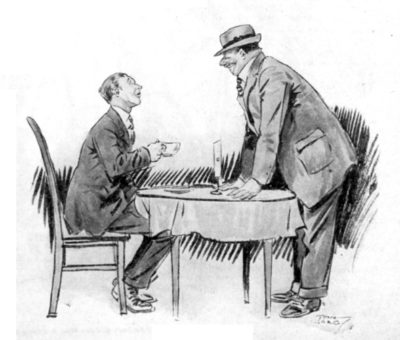
“I wouldn’t trust a politician,” says Lizzie, cold; “not even with nothing.”
“Is you really gonna take the job?” butts in Jim, quick, to cover up his wife’s fox paws.
“Why not?” I inquires.
“Well,” says he, “it’s a pretty dirty game, ain’t it?”
“Ever play in it?” I wants to know.
“I wouldn’t touch it with a six-foot pole,” he comes back. “They ain’t nobody in politics but a lotta grafters.”
“We once lived in a house,” says I, “where we had a furnace that was always on the bum. One day it got so cold I went downstairs to see what the hell. I found out the janitor was peddling the coal I’d bought and hadn’t taken the ashes out for a month. So I canned him, cleaned the thing out myself and never did have no trouble after that.”
“You should oughta get the kinda furnace we is got,” remarks Lizzie. “Jim says — ”
“The furnace I’m talking about,” I continues, “is a figure in speech.”
“Ours is a Little Diamond Hot Box, ain’t it, Jim?” inquires the sciatica.
“Where’d Lizzie go?” I asks, acting kinda surprised.
“I’m here,” she answers, wide-eyed.
“You’re here, all right,” says I; “but you ain’t there. What I was trying to broadcast,” I goes on, turning to Magruder, “before that frau of yourn turned on the statics, was the idea that if you don’t like dirt you can’t cuss it outta the room; you gotta grab a broom and sweep.”
“I suppose,” sneers Jim, “you’re gonna make politics as clean as a hind tooth, huh?”
“I’ll maybe try,” I answers. “What’ll you do? Stand around while some dip frisks your pockets and bawl out the coppers instead of taking a crack at the crook?”
“Jim ain’t afraid of nothing,” says Lizzie.
“I ain’t afraid of my wife neither,” I shoots back.
“You calling me nothing?” busts out the misses, who ain’t said a word so far.
“Not a thing,” I returns, hasty. “You vote at the last election, Jim?”
“What for?” he comes back. “They don’t count ’em anyways.”
“Well,” says I, “it’s a cinch they don’t count them that ain’t cast. When I gets to Albany — ”
“So you’re going?” interrupts Magruder.
“Yeh,” I tells him. “I kinda feels that I owes that much to prosperity. I’m looking ahead to the time when Dink O’Day Day will be celebrated from Rock Bound, Maine, to Climate, California, and when statutes of me in the parks will be as thick as empty shoe boxes after a church picnic.”
“You’ll look swell in the legislature,” sarcastics Jim. “What do you know about parlor-mantel law?”
“No more’n I know about kitchen-sink law,” I admits; “but it won’t take me more’n a minute and a half to run it down and make it drop from exhaustion.”
“I never seen a guy hate his wife’s husband like you does,” says Magruder. “Ever hear of Roberts’ Rules and Orders?”
“I don’t wear no man’s collars,” I answers, “and that bird Roberts ain’t gonna give me no orders. Anyways, Luke Cravens is the boss of the district. Where does this Roberts boy — ”
“You wouldn’t understand,” cuts in Magruder, “even if you knew. For example, suppose you was to get on the floor of the house — ”
“Who’s gonna put me there?” I yelps. I don’t want you to get no ideas I’m such a stupe as I sounds, but I’m even willing to carry that reputation for the pleasures of razz-jazzing Magruder.
“I mean,” he explains, “if you was making a speech on some bill and a bobo should get up and move that it should be put on the table, what would you do?”
“It all depends,” I answers, “on the way he said it. If he was nice and polite, I’d put it there; but if he tried to rough-bluff me into doing it, I’d leave it just where it was and he’d probably spend the next few minutes picking a inkwell outta his hair.”
“Flying codfish!” hollers Jim, waving his hands like a yell leader. “And you’re the kinda guy that’s gonna make laws for fifteen million people!”
“That’s what,” says I; “but what do you expects if right thinkers like you won’t take no interest in politics and’d rather play golf than vote?”
“Talking about golf,” comes back Magruder, “is you really gonna introduce that tax bill?”
“I’ll tell the popeyed world I am,” I replies. “A dollar on each ball and five fish on each club.”
“Think you can put over a grab like that?” he asks.
“I wouldn’t be so surprised,” I answers. “When I gets done telling the boys about the terrible housing conditions of the ducks on Long Island on account of the land being drug out from under ’em for golf courses, I expects the tax’ll go with one big sob. D’you know things is so bad on the North Shore that seven and eight ducks is gotta sleep on one rock?”
“I didn’t even know ducks slept on rocks,” remarks Lizzie.
“You should study national science, gal,” I returns. “What’d you suppose they slept on? Credit? Where’d you imagine the expression ‘duck on the rock’ come from?”
“I don’t know,” says she.
“I don’t know the name of the saloon neither,” cuts in Kate, slipping me the glare to sidetrack. “Please stop teasing Lizzie and try and give a imitation of talking sense.”
“Who should I imitate?” I inquires. “Jim?”
“You couldn’t go further and do worse,” suggests the Magruder exposed nerve; and when I starts laughing she goes on, all flustered, “I means, you could go further and do no worse.”
“That’ll be enough,” yelps Jim. “I’ll do my own answering back from now and on. Cutting the kidding cold,” he continues, turning to me, “I thought that golf-tax idea of yourn was to keep the cheap johns from building links around Doughmore and the other swell clubs.”
“Even a natural error like you,” says I, “couldn’t be no wronger. Can you see me pulling chestnuts at a fire for the plutocats around here? I’m a friend of the common people and — ”
“The commoner, the friendlier,” interrupts the frau.
“Maybe,” I admits; “but I promised the duck growers of this district that I’d go to the front for ’em, and a promise and a performance with Dink O’Day is as alike as two peas in a puddle. Experts has tried with instruments and them slow movie cameras to find a difference between ’em, but without no luck. It was funny. Oncet they was studying a promise of mine, and when I told ’em after a coupla hours it was really a regular performance and not no promise a-tall, they just gave up.”
“Doing business with a politician,” remarks Magruder, “I guess they hadda. When you gets to Albany them experts’ll be able to leave their naked eyes at home and still see the difference.”
“What makes you think so?” I inquires.
“Didn’t I hear you tell that Glumph woman you was gonna pass a law to stop all picture shows on Sunday, Wednesday and the nights the Ladies’ Aid met?” asks Jim.
“You did,” I tells him.
“Yeh,” jeers Magruder; “and wasn’t I there when you promised Mildew down at the Tivoli that you’d put the censors on the hummer and fix it so the film folks could do anything they wanted to, within reason and without?”
“Such is the case and the facts in it,” I confesses. “What about it?”
“How you gonna keep both promises?” demands Jim.
“What,” says I, “leaving out present company, could be simpler? I’ll introduce the bill the Glumph frill wants and also the one Mildew’s after.”
“How,” yelps Magruder, “can you be on both sides at oncet?”
“Ah,” I returns, “that’s what makes politics a art. What’s wrong with the way I’m doing? Some of the folks in the county wants this; some others don’t want that. Who’m I to say what’s proper for ’em? I’m just like a waiter in a restaurant. Everybody that comes in asks for something different. I puts in the order. If the chef don’t wanna cook up the mess, whose fault is it? A jane drifts in with her trap all set for a pair of fried wizzle-wumph eggs, sunny side up. Is it my business to tell her they ain’t good for her complexions and try and set her up to a platter of raw ox ears?”
“You mean rare, don’t you?” inquires Lizzie.
“I don’t know no more what you’re talking about than you do,” says Jim; “but how you gonna vote on these different things when its comes to a show-down?”
“O’Day,” I replies, “is far enough down on the roll call for my judgment and my conscience to get together before I has to. I’m gonna introduce everything that anyone wants and let ’em take their chances. Personally, nothing don’t interest me excepting my duck bill, and I shall fight for it with all the powers I has, with faith in the right and — ”
“Oh, hire a hall!” snaps Magruder.
“The Monday Club’s got a dandy place,” says Lizzie. “You can get it for fifty dollars a night; besides, they is still got the decorations up from the Pappa Eta Motza sorority dance.”
III
Me and Cravens goes to Albany together, Luke figuring on introducing me around to the high moguls of the party and seeing that I get started off K.O.
“You’ll be kinda busy getting settled,” says he, “so I has taken a little work off your hands.”
“What work?” I asks.
“Well,” he answers, “I figures they is about eight jobs you’ll get to hand to the boys in the district and I’ve picked ’em for you. Seeing as I got you into this, the leastest I can do is to save you from being bothered. I has even notified the lads we’s named.”
“That’s nice,” says I; “but — ”
“’S all right, Dink,” cuts in Luke. “They ain’t no thanks necessary. It’s maybe taken up some of my time and all that; but when I likes a guy, going to trouble for him’s a pleasure.”
“Yeh,” I returns; “but how about them fifty or sixty birds I promised plums to?”
“Albany,” answers Cravens, prompt, “is quite a town. They is a coupla good hotels, and I knows a restaurant I’ll take you to, where you orders tea and gets what you meant.”
Not caring nothing about them jobs at Doughmore, I don’t chase the subject no further. Anyways, I don’t aim to stay long. My ideas is to stick around the legislature just enough to see what makes the thing tick and maybe pull a stunt or two that’ll get me in bad with the jokes at home, after which me and politics’ll call it a day.
Luke makes me acquainted with a bunch of bobos that is supposed to run the works and winds up by taking me to the mansion to meet the governor. He turns out to be a decent feller.
“I has heard a lot about you,” says he to me.
“I’ve seen your name mentioned, too,” I comes back, not to be undone in courtesies.
“I wanna talk to you someday about taxes,” he goes on. “I understands you has studied ’em deep.”
“Governor,” I replies, “I don’t wanna brag, but if they is anything about taxes I don’t know it musta been sprung the day after tomorrow.”
“That’s fine,” smiles the big chief. “They is causing us a lotta trouble. ‘
“Unwrinkle your brow, gov,” I cuts in. “My golf bill will solve everything.”
“I must look into it,” says he, and me and Cravens beats it.
“I thought,” remarks Luke, “that you canned that tax idea of yourn when the Doughmorons started being for it.”
“No,” I tells him, “I’m going through with it just to prove to them coupon barbers that they give me the wrong rap.”
“Well,” says Cravens, looking at me kinda narrow, “the play might work out good for you at that.”
“You mean,” I asks, “the bill might pass?”
“It’s got as much chance of doing that,” he answers, “as one of them ducks of yourn would have in a scrap with three wildcats, four hyenas and a pair of Australian gluffaws.”
“I don’t get you,” I returns, puzzled.
“No?” smiles Luke. “All right, Rollo, roll your own hoop. If you should want me to cut in later on, you knows where to find me.”
I’m still all up in the air trying to figure out what Cravens’s been driving at when I gets to the hotel by myselfs and runs into Shem Conover, a baby from up in the state that was knocked down to me earlier in the day as a real slicker in jamming stuff through the House.
“I been waiting to see you,” says he. “I wanna little chin-chin.”
“About which?” I inquires.
“That golf-tax bill you’re touting,” he answers. “Need any help?”
“I ain’t so sure I’m going through with it,” I tells him, not liking the bimbo’s looks.
“Who’s been talking to you?” he asks, slipping me the narrow eye like Cravens done.
“What you getting at?” I yelps, getting kinda peeved at the mystery stuff.
“Listen, bo,” says Conover, “and don’t try and gruff me off the lay. If you wanna get any action with that bill of yourn you gotta be sweet to me. I’m chairman of the committee that’s gonna get it, and if you don’t put me in the line-up — ”
“What’ll you do?” I barks.
“I’ll fix it,” he comes back, slow, “so that the chloroform won’t work when you want it to, and when you gets ready to deliver the body you’ll find the livest corpse you ever seen.’
“I’ll sue the Central for this,” says I. “When a lad buys a ducat for Albany they ain’t got no right to dump him off at Matteawan.”
“You’re in Albany, little one,” remarks Conover, cold; “and when you is in Albany you gotta do like the Albanians does. Do I get a hand dealt me?”
“I ain’t gonna introduce the bill,” I growls, “and besides — ”
“Too late,” interrupts Shem. “If you run out on it I’ll have it introduced as a committee measure. The idea’s too cushy to drop. They worked it with patent medicine down in Arkansas and with baking powder out in Missouri, but the golf act’s a new one on the sandbag circuit. Give it a coupla thinks,” he finishes up, and drifts away casual.
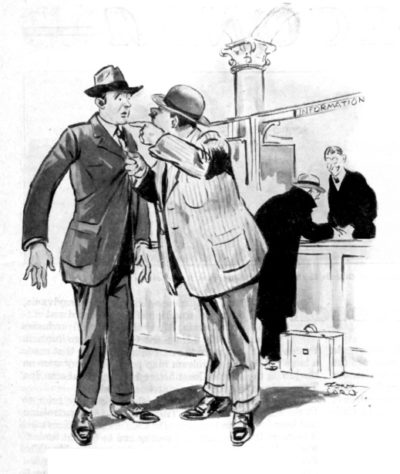
I looks around expecting a guy in blue with a bunch of keys to grab him, but nothing like that don’t happen. Dizzy and woozy, I drifts across the street to the restaurant Luke told me about and squats me down.
“What’ll you have?” asks the waiter.
“A cup of tea, God forbid,” says I.
It’s wonderful what a little oolong will do for a lad that gets the kind he means instead of the sort he asks for, and right away I begins to perk up some. But it don’t last long. I’m about to yell for an encore when I looks up to see a feller standing besides me, a stout, surtaxy appearing citizen with a wide grin.
“Know who I am?” he inquires.
“Considering the luck I been in all day,” I answers, “you couldn’t be nothing excepting a revenue agent.”
“My card, Mr. O’Day,” says he, and slips it.
“‘August P. Stevens,’” I reads aloud, and then to myselfs, “‘representing the Universal Outdoor Co.’”
“You cover all that territory by yourselfs?” I asks.
“No,” he comes back; “I’m mostly in Albany and Washington.”
“What do you sell,” I wants to know, “scenery or air?”
“I don’t sell,” he returns, looking me straight in the eyes. “I buy.”
“What?” I asks.
“Different things,” he answers, evasive. “I suppose you know we is one of the largest sporting-goods houses in the world. Naturally, we is interested in your bill to tax golf balls and sticks. Shall I sit down?”
“If your lumbago’ll let you,” I replies; “but you might as well know later than sooner that I’ve heard enough of that bill this afternoon to last me until three weeks after my funeral. I ain’t even sure I’m gonna flip it into the hopper.”
“The boys around here,” says Stevens, “’ll tell you that I’m a square shooter and don’t mince up no words. With me a spade’s a spade and I know how to dig. What do you need to help you make up your mind about that bill?”
“Which way?” I mumbles, fanning for time.
What a zero brain I’d been not to get jerry to that talk of Luke and Conover about sandbags and chloroform and the such!
“Our way, of course,” answers the sportsgoods man. “You forget the golf tax and we’ll not forget you.”
“I see,” says I; “you wanna bribe me not to put the bill in.”
“Oh,” returns Stevens, “you can put it in; but it’ll get sick in the committee room, be operated on and die under the ether. All you gotta do is to let the dead stay dead and get all wound up in something else. You ain’t got a thing to lose. They ain’t no chance of jamming the tax over and — ”
“What do you wanna buy me off for then?” I cuts in.
“Well,” says Stevens, “they is always a outside possibility of anything going through in the last-minute rush. Besides, we don’t wanna have taxes on balls and clubs even discussed.”
“You can’t stop that,” I retorts. “I’m full of it now.”
“Full of what?” he inquires.
“Disgust,” I snaps, and ducks outta the place.
IV
They ain’t no meeting of the legislature the next day, and I runs down to Doughmore, first having wired Cravens that I was coming and for him to meet me. I ain’t one of them holier than thous, but raw work always did get me sore, even in them times when I didn’t ask a dollar bill for references. Luke sees right off that I’m riled.
“Do I look like a grafter?” I asks.
“The light ain’t so good here,” he comes, back, calm. “What makes you doubtful?
I cuts loose and tells him everything that happened to me in Albany after he left. He listens with about as much excitement as I was retailing a bright crack pulled by my third cousin’s infant progeny.
“You don’t seem surprised none,” I remarks at the finish. “Is they all dips up in Albany?”
“No,” replies Luke, “they is about 95 percent honest; but at every session in every legislature they is always a few sandbaggers — guys that push in stick-up bills, not with any hopes of passing ’em, but on it gamble that somebody will get all scared up and buy ’em off. The railroads used to be the prize marks, but — ”
“Say,” I shoots out a yelp, “you ain’t got no ideas that I’m a sandbagger, is you?”
“Well,” returns Cravens, “at first I thought that blah of yours about golf and ducks was just some pretty fun you was having with the Doughmorons; but when it flopped with them and you kept right on yelling tax, even in front of the governor, I begun to get a little suspicious.”
“Honey sweets the Malay’s pants!” I hollers.
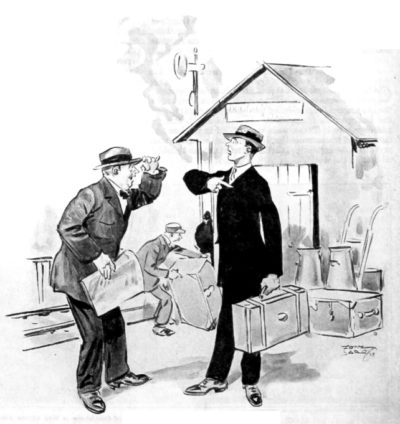
“Huh?” inquires Luke.
“That’s Latin,” I explains, “for lads with evil minds that thinks everybody else is got ’em.”
“Evil mind, eh?” says Cravens, kinda peevish. “Any bird that’ll go to the front for a new nuisance tax, when everybody in the country is nearly bent over double carrying the load of ’em they got now is either a stupe or a grafter. And you ain’t so stupish.’
“Damn it,” I barks, “I’ll — ”
“Listen to me,” interrupts Luke. “I ain’t calling you a crook, but what do you expect people’ll think of a bobo in these times that’ll talk up another gouge, and picks out a nice juicy game like golf for the victim?”
“I was only kidding,” I mumbles, feeble;
“I suppose,” admits the chairman; “but like the feller remarked after lugging careless baby six blocks, they is such a thing as carrying a kid too far.”
“It seems to me,” says I, suddenly remembering his stuff in Albany, “you was willing to take your bit.”
“I was,” he answers, cool, “I don’t never throw no spoons away when it’s raining soup.”
“Gosh,” I groans, “I’m in a swell fix. If I don’t introduce that bill now they’ll say I been bought off. If I does, I’ll have to go to the mat for it and keep fighting all the time I’m gonna resign,” I announces, blunt.
“That’ll be the worst yet,” says Cravens “Then they’ll figure you was bought off good and was afraid of a investigation.”
“What shall I do?” I asks.
“Just forget all about it,” advises Luke. “I’ll fix things with Stevens and Conover so nothing’ll ever be mentioned about the golf bill.”
“Sure you can?” I wants to know.
“Certain sure,” says Cravens. “Won’ I the guy that sent ’em to see you?
On the way to the house I meets up with Lizzie. “I just been to the Monday Club,” she tells me. “You still wanna hire a hall?”
“No,” I answers, “not a hall — a hole.”
“A hole?” repeats Lizzie. “What you gonna do with a hole?”
“Crawl in,” says I.
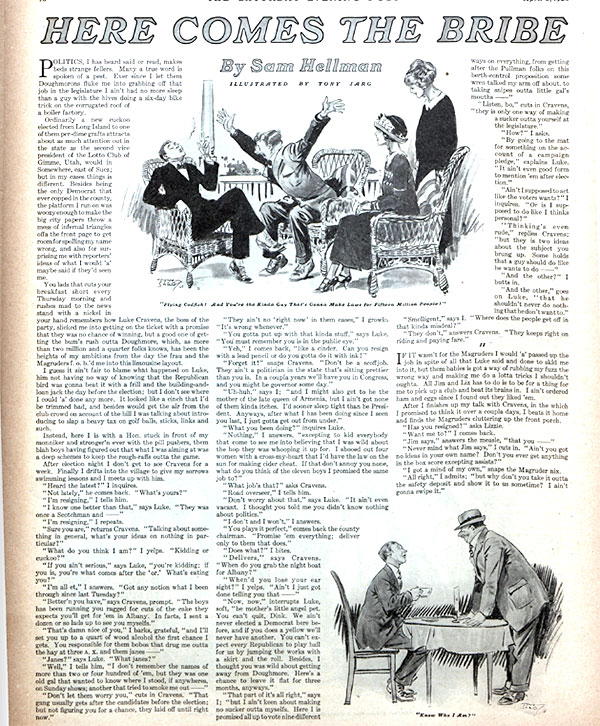
Featured image: “Flying codfish! And you’re the kinda guy that’s gonna make laws for fifteen million people!” (Illustrated by Tony Sarg)
“Home-Brew” by Grace Sartwell Mason
With more than 80 short stories and eight novels, Grace Sartwell Mason’s thematically diverse work found many publications in the period before and after World War I. Though her fiction and criticism has slipped through the cracks of familiarity over the years, her story “Home-Brew,” about the secretive and adventurous family of a budding New York writer, was an O. Henry Award finalist.
Published on August 18, 1923
Content Warning: Racial slurs
“Of course, they’re all dears, my family,” said Alyse; “but as fiction material there is nothing to them; no drama, you know; no color; just nice, ordinary, unimaginative dears. They’re utterly unstimulating. That’s why I can’t live at home, and create. They don’t understand it, poor dears; but what could I possibly find to write about at home?”
She crushed down upon her hair, with its Russian bob, a sad-colored hat of hand-woven stuff, and locked the door of a somewhat crumby room over the Rossetti Hand-Loom Shop, where she worked half time for a half living. A secondhand typewriter accounted for the other half; or, to be quite truthful, for a fraction of the other half. For her father, plain George Todd, helped out when the typewriter failed to provide.
She then betook herself on somewhat reluctant feet to the nearest Subway. For this was her evening at home with her unstimulating family; and though she was fond of them all, her predominating feeling for them was a mixture of amusement, tender tolerance and boredom. Moreover, they lived in Harlem, which was a deplorable wilderness, utterly lacking in atmosphere and a long, long way from the neighborhood of the hand-loom shop.
In the Subway, miraculously impelled through the bowels of the earth, Alyse — or Alice, as she had been christened — refrained from looking at the faces opposite her. The Subway does something curious to faces. It seems to drain all life out of them; it strips from them their defensive masks and exposes the deep and expressive scars of existence. A secret and hidden soul comes out in each Subway face. But Alyse averted her eyes.
“Dear me,” she sighed, “how dull they are! Isn’t there any beauty left in the world?”
Her father and his chum, Wally, were just ahead of her as she came up from the Subway depths. They were wending their way to their respective homes, having come up from downtown together, as was their invariable custom. Alyse gazed at their middle-aged backs without seeing anything unusual about them. Just two plodding men, getting tubby about the waist, with evening papers under their arms, walking along, not saying much. But when they reached George Todd’s door they would look at each other, and the passerby might well have stopped and taken off his hat, as before something rare and soul-satisfying. For here was perfect peace in friendship.
But all they said was: “S’long. See you tonight, ol’ hoss.” Or, “See you t’morrow mornin’, Georgie.”
Alyse had heard the tale of her father’s miraculous reunion with Wally so many times that it meant nothing to her. It seemed that as boys they had lived within two doors of each other in a small New England town, and they had been inseparable. First thing in the morning and last thing at night they were whistling outside each other’s windows; they owned a dog in common; and when George had scarlet fever, Wally nearly died from anxiety. Then, at sixteen, life had borne them in different directions. Wally drifted finally to Alaska and George got a job in New York. For a time they corresponded, but after a while letters began to come back to George marked Not Found, and then in a roundabout way he heard of Wally’s death.
Although George Todd was happily married, with a growing family, he admitted that the world would never seem quite the same to him with Wally out of it. Then came the happening that convinced him there are mysterious and unexplainable things in the world, say what you like. He was coming home from work one night, walking from the Subway rather more slowly than usual and enjoying the spring twilight, when in some strange way his heart stirred. He remembered how on evenings such as this he and Wally used to play a game in which one tossed a ball over the house to the other and gave a peculiar call. The middle-aged George declared that all of a sudden he could hear this call, and wanting to fix it in his memory, he endeavored to imitate it by whistling its rather melancholy intervals.
And at his whistle a man walking in front of him suddenly whirled and stared at him. It was Wally — Wally, with a newspaper in his pocket and a bundle of shirts from the laundry under his arm. He had been living within half a block of George for two years.
When her father told this story to Alyse he always at this point gave her an affectionate poke.
“Now there’s a story for you, Allie. You write up about Wally being washed out to sea and given up for dead and working his way around the world, and finally settling down in Harlem right next door to his old chum. And that about the whistle. What was it made me think of that old call?”
Alyse would explain that it was coincidence, and coincidence was the lowest form of literary life. She was patient about it, but there was nothing stimulating to her creative imagination in Wally and that come-and-find-me voice he had listened to half his life. Still less was she stimulated by her father, George Todd, owner of a feed and grain business of the most eccentric instability. He was a dear, and she loved him; but she hoped as they all sat down to supper that he wouldn’t begin to joke her about her work or offer her the plot for a story.
It was a spring evening and the dining room windows were open to the two lilac bushes which Alyse’s mother had nursed for years in the narrow, sooty backyard. The room was filled with an unreal light, as if the air was full of golden pollen dust. And something else, invisible and palpitant, was in the air of the homely room, something not to be seen but only sensed. Some intense preoccupation a sympathetic eye could have noted in three of the faces around the table.
“Well, well, we’re all dressed up tonight,” said George Todd, unfolding his napkin. “Look at Miggsy, Allie. Won’t she knock somebody’s eye out tonight?”
Alyse looked at her young sister, Mildred, aged sixteen. Mildred blushed, fidgeted, pouted entreatingly at her father. She was a thin little beauty, with a soft cloud of corn-silk hair about her face. In her red mouth desire and wistfulness mingled. Tonight her eyes were stretched and brilliant. She twitched at the table silver and appeared to have no appetite.
“Eat your spinach, dearie.” Her mother’s eyes brooded over her tenderly. “I thought you liked it creamed.”
“I do, but — Goodness, mother, is that clock right? I must fly!”
“But there’s chocolate pudding for dessert, dear.”
“Now, Miggs, finish your dinner. Why be so fidgety?”
Mildred looked in desperation from her father to her mother.
“But I don’t want any dinner, please! I — I have to be there early. Please let me go now, mother.”
She danced from one foot to the other, the secret excitement in her eyes threatening to change to anger. She had spent most of the time since she came home from school that afternoon in front of her mirror, and she was now exquisitely polished, powdered and perfumed. From under the fluff of hair over each ear an earring of blue to match her eyes dangled.
Alyse disapproved of the earrings and of the general effect of Milly tonight. She made a mental note to speak to her mother about letting the child go out so many evenings. But beyond the earrings and the general overstrung and overdressed effect she did not penetrate. She made no attempt to interpret the secret excitement in her young sister’s eyes. The affairs of a girl of sixteen were too inane and foolish to be taken seriously.
At the table when Milly had gone flying up the stairs there remained Alyse, her father and mother, Eddie, twenty-one, and Aunt Jude. Alyse glanced around the table and suppressed a sigh. The monotony of the lives of her family sometimes oppressed her. Take her mother, for instance. She seldom went outside the house except to church or to an occasional motion picture with Wally and George. All day she did housework or looked after Grandma Todd when Aunt Jude was at work. She did not have a cook because of a queer passion for feeding her family herself. But when she had them all there in front of her, ranged around the long table, and she had put onto their plates the well-cooked, savory dishes they liked, she would sit, eating little herself, looking from one to the other with her slightly anxious, tender glances, while gradually an expression of peace and satisfaction stole into her face; and Alyse wondered what her mother was getting out of life.
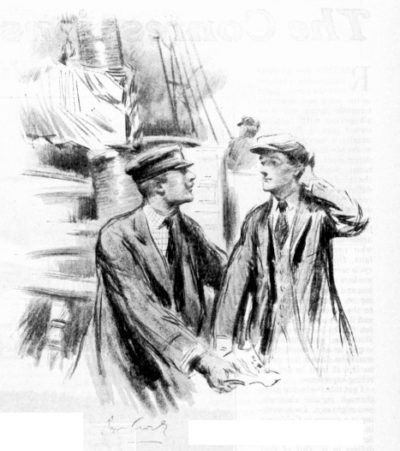 Take Eddie, also. No one, except perhaps his mother in odd moments, ever got a peep-in at Eddie’s thoughts. Alyse was of the opinion that he didn’t have any. There had been a time when she had tried to bring Eddie out by coaxing him down to her rooms over the hand-loom shop and introducing him to some of the girls she knew. But those clever and voluble maidens had abashed Eddie unspeakably, and Alyse had let him lapse back into his own plodding life. He apparently had no imagination. Soon after he left high school he had gone to work for a seed house downtown — George Todd badly needing help that year with the family expenses — and there he still was. Alyse hadn’t the slightest idea what were his amusements. Saturday and Sunday afternoons he generally disappeared, and when asked what he had been doing, he had been to a ball game or just taking a stroll around. He subscribed to a marine journal, which seemed strange reading for a packer in a seed house.
Take Eddie, also. No one, except perhaps his mother in odd moments, ever got a peep-in at Eddie’s thoughts. Alyse was of the opinion that he didn’t have any. There had been a time when she had tried to bring Eddie out by coaxing him down to her rooms over the hand-loom shop and introducing him to some of the girls she knew. But those clever and voluble maidens had abashed Eddie unspeakably, and Alyse had let him lapse back into his own plodding life. He apparently had no imagination. Soon after he left high school he had gone to work for a seed house downtown — George Todd badly needing help that year with the family expenses — and there he still was. Alyse hadn’t the slightest idea what were his amusements. Saturday and Sunday afternoons he generally disappeared, and when asked what he had been doing, he had been to a ball game or just taking a stroll around. He subscribed to a marine journal, which seemed strange reading for a packer in a seed house.
And there was Aunt Jude. Really, when you considered everything, what had Aunt Jude to live for?
Judith Todd was at that moment preparing a tray for Grandma Todd, who was having one of her faint spells and declined to come down to supper. With her long, slender fingers moving deftly, Judith made the tray inviting with the china she had bought especially for it. She had hurried her own supper so as to have plenty of time for the tray, and she moved from the table to the sideboard with the air of detached and ironic competence she sometimes wore when she was, as Alyse said, spoiling Grandma Todd. She was George Todd’s younger sister, thirty-eight, a spinster with the reputation of having been in her youth very high-spirited, adventure-loving, and moreover with a streak of queerness about her. As, for instance, her ambition to be a sculptor. In those days and in the Todds’ native village a girl might as becomingly have wanted to be a circus rider. It was said there had been some stormy scenes over days wasted in the attic with messy clay. But finally life itself had put a bit between her teeth — life and her mother’s well-timed heart attacks. Her father had failed in business and died, George had married early, and the brunt of taking care of her mother had fallen to Judith.
After a while she had brought her mother to George’s house, which helped George out with expenses and enabled Judith to make a living for herself. It was the nature of her job that convinced Alyse there couldn’t be anything in that old story about Aunt Jude’s having wanted to be an artist. It was such an absurd job. She worked for one of those concerns that produce novelties — favors, table decorations, boudoir dolls — designing many of these silly fripperies, often making them with her own hands. She had remarkable hands.
If she had an ounce of talent, Alyse decided, how could Aunt Jude go on, year after year, squandering herself on these silly and often grotesque objects? Alyse felt that it would have killed her to have so degraded her talent.
But Judith actually appeared to get a certain amount of fun out of the dreadful things. She would bring home samples of her handicraft and bedeck the supper table with tiny fat dolls in wedding veils, droll birds and beasts in colored wax, and so on. And in one of her high moods she could set the family to laughing with a single tweak at one of these grotesqueries. On these occasions a gay and malicious sparkle would come into her dark eyes, and her laugh would be high and reckless, rather like a person who has taken a stiff drink to ease up an ancient misery.
Two evenings a week she went out, no one knew where. Alyse had seen her once at the opera, leaning far out from the highest gallery, a frown between her brows, seeming to watch rather than to listen, with a wild brightness in her dark eyes. The general impression of the family was that these regular evenings away from home had something to do with her work. On these particular evenings there was always a breathless air about her. She would hasten in from the street, and as she climbed the stairs to her mother’s room her face would stiffen as if for conflict. For Grandma Todd resented these evenings.
“Traipsin’ off,” she called it. “Lord knows where. Something will happen to you, coming home alone after ten o’clock. I don’t think you’d better go out tonight, Judith. My heart has been fluttering this afternoon. If I have to lie here worrying all evening I shall probably have a bad spell.”
And then into her daughter’s face would come the expression of a person swimming painfully against the tide. Love and pity had overcome her at every turn of her life, until at last she had almost nothing of herself left, except her freedom for these two evenings. As if the call of them was more imperative even than her long habit of abnegation, she fought for them with a sort of desperation.
Tonight as she arranged her mother’s tray her fine hands trembled a little; she looked more than ever as if she were straining at a leash. There was an unusual color in her face, a sort of flame, which for an instant attracted Alyse’s attention. Aunt Jude, she reflected, must have been almost beautiful when she was younger, before the expression of half-defiant endurance came into her face. Her dark hair was still lovely, with its blue-black shadows. Over her brow was a white lock, which she took no pains to conceal. She wore it rather like a defiant banner, and it went well with a certain gallant air she sometimes had.
As soon as supper was finished the family began to melt away. Wally called for George Todd and they went out. They admitted, grinning, that they were going to an express-company auction of unclaimed packages. It was one of their pet forms of entertainment, and they frequently brought home queer bundles, which they opened with shouts of amusement. Alyse thought they were dears, but rather foolish. She could not guess that when they started out of an evening arm in arm they became boys again, and forgot that life had been a somewhat niggardly affair for them.
A moment later Miggs made a dash for the door, pulling on her long gloves. Her face was flushed and exquisite under her modish hat.
“I’ll have Eddie come around to Jane’s for you, Milly,” her mother called to her.
A shadow of fright and annoyance came over Miggs’ face.
“No, please don’t, mamma. Jane, or somebody, will come home with me. Besides, we — we may go to a movie. Don’t fuss over me, mamma. I’m not a baby.”
Then she darted back into the room, caught her mother’s head in her slim arms, snuggled her little powdered nose into her neck.
“Oh, mamma, I’m all right. I’m just so full of pep tonight I’m — I’m snappy. Don’t you worry, darling.”
And licking her scarlet lips, glancing once more into the mirror of the old-fashioned sideboard, she was off — a hummingbird caught in a mysterious gale.
Then appeared Aunt Jude, her jacket over her arm, the tray in her hands. Her dark eyes were feverishly bright, but her face looked pale and strained. Would they mind just cocking an ear now and then toward mother’s room? She would probably drop off to sleep soon, though she had made up her mind she wouldn’t.
“But I must go tonight,” she said; “just tonight. Perhaps after this I — won’t be going out Tuesday and Thursday evenings.”
She stood still, staring down at the tray she had put on the kitchen table. Then she threw up her head with the familiar defiant movement, made a sound as if of scorn at her own weakness, and shrugging herself into her old blue serge jacket, she, too, darted out into the evening.
Eddie stood by the window. He stooped to look up at the dark blue of the night sky — a gesture habitual with him — fiddled wistfully for a long moment with the shade, and then pulled it down as if resolutely shutting something out. But a moment or two later he took his hat down from the hall rack, muttered to his mother “Be back early,” and slid out the front door, as if suddenly afraid of being late for something.
The house fell silent. Alyse’s mother put a dark-red spread on the dining-room table and placed her darning basket under the light.
“Now this is cozy,” she said happily. “We’ll have time for a nice visit. Tell me about your work, dear. I’ve been hoping maybe you’d feel like coming home to stay as soon as you’d got some material to work on. Of course, I understand,” she added humbly, “you have to have something to inspire you.”
“That’s exactly it, mother. I must know interesting persons. It’s very important to be stimulated. Sometimes I’ve thought that if I could only go to Russia or Austria or some place where there is a sense of crisis, a — a vividness, you know; strife of souls. That’s what I want to study. You see, mother? And, of course, here at home — ”
Her mother sighed.
“I know we’re all pretty ordinary, and nothing much happens, here at home.”
She looked apologetic, as if she realized the family’s limitations and wished she could offer something more interesting to her talented daughter. She dropped the old darning egg into the heel of a sock. The homely house was very quiet.
And a few miles farther south Milly was running breathlessly up the Subway stairs, an eager, half-frightened Proserpine coming up from the bowels of the earth into flowery meadows, into the glare of the electric flowers of Broadway.
And a few blocks north Judith Todd stood in a dark doorway and whispered: “I mustn’t hope for anything. If nothing comes of tonight, I can go on. But, O, God, make something come out right for me at last, at last!”
And Eddie —
At about this moment Eddie’s mother was rolling a pair of his socks into a neat ball. She sighed unconsciously.
“Sometimes it seems to me,” she said, “as if Eddie has never really waked up. I can’t express it the way you would, Alice; but as if he was driving himself — dumb, you know.”
“Doesn’t he like his job?”
“I don’t know. He never says. But sometimes he looks — And then there’s that Haskins girl. I’m afraid he’s let her push him into being engaged. I wish I knew — he’s so silent lately … When he was a little boy he used to lie on the floor by the hour, so happy, drawing pictures of ships.”
Ships! Alyse had never noticed them, but they lay like a fringe about the tall city, slowly rising and falling with the tide, lying there waiting to be unloosed to the seven seas. But Eddie knew they were there. All the miles of wharves he knew, from Sunday and evening rambles, from noon hours when he went without food to stand looking at some lovely visitor from an unknown port. And now at this moment he was making his way as fast as he could to say farewell to one that had become the very core of his heart.
More eagerly and more swiftly than he ever had made his way to the Haskins girl he traveled toward the North River. Just before he reached the corner beyond which he could look down upon the river he felt his heart grow cold with the fear that sometime during the day she may have slipped out to sea. It seemed to him that if she had gone he could not bear it; and yet he told himself that tomorrow night she would not be there; they had begun to ship her cargo.
But when he had rounded the corner, there were her masts against the deep blue of the night sky — five masts, the beauty! He had seen them two weeks before one night when he was leaning over the wall of Riverside Drive, and his heart had leaped. He had made his way down to the wharf alongside which the schooner lay, and stood there studying her, feasting his eyes on her. The tall cliffs of houses towered above her, but she smelled of many cargoes and of the sea. He could imagine her furled canvas slowly shaking out to the breeze, the deck tilting. The mate had come up on deck with his pipe and talked to him over the side.
Next evening Eddie was there again, and the mate invited him on board; he talked about the schooner as a man might about a wife whose very faults he loved. And Eddie had asked him questions which had been storing up in his heart since he was a boy. He could talk to this man Jennings, for they had a passion in common. Evening after evening they leaned over the deck rail or sat in the cabin, smoking and talking, and a deep friendliness developed between them.
Tonight when Eddie came to the edge of the Drive he did not hurry down as usual to the wharf where the schooner was tied up, but stood looking down at her. In his brain there was a misery and a battle. They were working overtime down there, loading the last of a general cargo, and that meant they would take advantage of the first tide. Tomorrow she would be gone, off to the River Plate. He shut his eyes hard and gripped the wall against which he leaned.
Tomorrow he would go downtown as usual in the Subway, and all day long he would be nailing up boxes in the basement of the store, and in the evening he would go around to see Lily Haskins. Under his breath he uttered a sound between a groan and an oath. He felt bewildered when he thought of Lily. He gazed at the five masts against the sky and they were like a shining vision beside which Lily Haskins was but a dull unreality. Was it actually true that he was going to marry, to go on all his life nailing up boxes as if they were his own coffin?
His feet carried him slowly down toward the wharf. He must say goodbye to Jennings, no matter how much he shrank from going on board the schooner again, and as he went down the long stairs he was wondering at the stupidity of his own life. Why hadn’t he talked things over with someone? Perhaps someone else could have told him whether he was really obliged to marry Lily. But he guessed that he had always been dumb. Life had gone on within him, half alseep, in the dust of the packing room, until he and Jennings and the schooner became friends.
And after that he had awakened, but he was still dumb. Perhaps if years ago he had begun to talk about what he wanted to do — But that year when he was eighteen, and making his secret plan to join the Navy, was the year dad’s business was so poor. He couldn’t desert him when he was so hard pressed. Perhaps later, when dad had got on his feet, he might have broken loose, if only he had believed in his dream; if he hadn’t been afraid of being laughed at.
His thoughts went still farther back, to the days when he used to cover immense sheets of paper with pictures of ships, full-rigged, with each detail as correct as he could make it from pictures he had seen.
He remembered looking up one day from his drawing with a sudden vision in his heart and crying out, “When I grow up I’m going to be a sailor!”
And someone, he could not remember who, had laughed. For a long time they called him Yeave-Ho. The door of his heart through which this cry had gone out had closed.
If he had cared less about his dream, the door would not have closed so tightly, perhaps; or if there had been anyone in his world who did not regard the sea as merely a blue blur in a geography.
Well, if a man was a sensitive fool, he had only himself to blame. He closed his lips more tightly and went on down the wharf. Two fellows passed him with bundles over their shoulders. The crew was going on board. In the light of torches the last of the cargo was being hustled on board. The light streamed upward and touched the masts; the vessel moved slightly with the tramping of feet and the lifting of the tide. With the lights, the shouting and movement of men, the schooner seemed to rise on tiptoe, eager and expectant.
In a shaft of light stood Jennings, checking off the crew as they came aboard. Down the wharf came the captain, a man behind him carrying bags and bundles. As soon as he climbed on board, Jennings could be seen showing him a telegram, and the captain frowned. Eddie, his habitual diffidence overcoming him, shrank back into shadow; but presently when the captain had gone into the cabin, Eddie moved over to the edge of the wharf and called, “Goodbye, Mr. Jennings! Just thought I’d come down to wish you — wish you — ”
But before he could finish, Jennings leaped and grasped his shoulder.
“Eddie! By cricky, boy, you look good to me! Look here!” He waved the telegram under Eddie’s nose and dragged him on board. “Look here, it’s Providence sent you down here just now. Petersen’s in hospital. We’re short a hand. My boy, it’s your chance! You’ll never have a better one. How about it? You’d have time to get your dunnage. Le’s see — tide will be right in two hours and fifteen minutes; all the time in the world. What say?”
The night reeled and rocked around Eddie.
“Tonight!”
The mate drew him forward, whispering, “Look here, you know as much about a vessel now as Pete ever did. You were born for the sea, and that’s the truth. This is your great chance to get your apprenticeship — good captain and a dandy vessel.”
Eddie stared about him while his heart pounded. He looked down the long lines of the schooner, he heard the masts faintly creaking and whispering in the rising wind, he smelled the unforgettable smell of a ship, and he choked with longing. He thought of his mother, but not at all of Lily Haskins. Could his father do without him? Would they all think he had gone crazy? Would they laugh? And at that instant the wind ruffled the water, the smell of the sea came stealing up the river, and the deck rose under his feet, an imperceptible movement to anyone not tuned to the sea. But to Eddie it was as if his heart itself turned over. His heart was like a seed, long buried in the dark and cold of the earth, which has been pushing blindly upward, and now at last sees the sun. His hand on the smooth curve of the mast tingled and drank in the feel of the ship, while into his soul there poured a new steadiness, a clean new certainty. His dumb boyhood was over and his beloved was under his hand.
Alyse yawned and her thoughts came back from her novel about Russia as her eyes fastened themselves on the chiffon stocking her mother was carefully mending.
“Really, mother, it’s ridiculous the way Mildred dresses. And ought she to go out every night? When I was sixteen I didn’t want to do anything but read.”
Her mother smiled and sighed.
“I wish to goodness Milly would sit down at home with a book. But she says life is so much more exciting than books. She told me the other day that she had to live her own life.”
“Life!” Alyse laughed scornfully. “That baby!”
It was at about this moment and several miles farther downtown in a dancing place called Poppy Gardens that Mildred, the baby, was on the verge of learning something about life. She was also being called an infant, but in quite a different tone.
“I’d jus’ soon tell the world,” said Dion Delanoy, holding her closer, “that you’re some little dancer, baby.”
And at the half-lazy, half-insolent caress in his voice, Milly thrilled with rapture and with discomfort. But it was very queer — there seemed to be two of her. One was intoxicated with delight and wonder, and the other held herself cool and aloof and, looking on, curled her lip. Overhead in the ceiling electric bulbs were stuck like pins in a cushion. When you tilted your head back so that your cheek touched your partner’s shoulder, all these lights reeled and swam after you around the room, and the floor undulated in long flat waves. When you floated through the green spotlight, Dion Delanoy’s eyes, like large shoe buttons in an ordinary light, became queer and sinister. When at the other end of the room the red spotlight washed over you, his pale dusky skin with the blue tinge from shaving had a bloom like an exotic fruit, and he became beautiful; he became what she had come out to meet, a romantic hero.
And she had reached that brief, glamorous season when there must be a hero to worship or one goes hungry and thirsty. When she had seen him in a bull fighter’s costume, with the footlights performing their nightly miracle with him, her hunger had fed itself upon him. Jane Tremont had been almost as bad, but it was her note he had answered, and she alone whom he had invited to meet him in the Peacock Alley of a Broadway hotel. It was Fate, his choosing her and not Jane, and it could only mean that they were meant for each other.
Having only just begun to learn about life, Milly didn’t suspect that the trysting spot Delanoy had chosen could be neatly overlooked from a balcony, and standing here, he could scrutinize his latest conquest and decide whether or not he cared to keep the appointment. He had been a bit taken aback by Milly’s youth, but it happened to be a dull evening. And besides, in the dressing room, heavy with the odor of stale powder, Milly had used a forbidden lip stick. He could not possibly know that in spite of her desirous lips her heart was pounding with fright.
But now, since they had danced for half an hour, fright had given place to this queer mixture of emotions; elation, dizzy wonder — she, Mildred Todd, dancing with a famous dancer, or at any rate a nearly famous dancer — hadn’t he had a dance practically alone, with the spotlight once directly on him? — and a curious undercurrent of vague unhappiness, as if already she had said good-by to someone she had shrined and now had lost. And those two individualities into which she had divided, the one whose lip curled sometimes, who looked on, not happy and yet not unhappy — homesick, rather — and the other, confused, ecstatic and silly.
“I feel funny,” thought Mills, “and nothing is quite like I thought it would be.”
Then the next minute she thrilled when someone behind them said “That fella’s Dion Delanoy.”
They had iced drinks at a sloppy table in a room off the dancing floor. He poured something into her glass from a flask, under the table. She became dreadfully sleepy and wished she were home and in bed. Then the lights around the dancing floor grew suddenly brighter and danced, and everything was gayer. Dion Delanoy became again a hero, and she knew that she herself was very wicked and beautiful. The cool half of her gave her lips one final curl of scorn and retired to an immense distance. The vague ache of disillusion left her too. She saw herself engaged to Dion Delanoy, giving a theater party in a box, and afterward taking Jane behind to meet him. He was her hero. He was marvelous. She clung tight to this thought, as if she knew that once she let it go she could not stand him.
And they wandered down to the street and into a taxicab. The drive was a flash and blur of lights, with Dion Delanoy holding her uncomfortably close. The taxicab increased her sense of wickedness, and she thought of a word she had recently added to her vocabulary — “insouciance.” She was convinced that she had a great deal of it, and as for Dion Delanoy he was magnificent with it. If only the cool and critical half of her would drop behind, and take with her the dim sense of sadness that was so oddly like homesickness.
“Wouldn’t it be perfectly terrible if I should cry?” thought Milly.
The cab stopped in front of a studio building.
“Friend of mine let me have his studio,” murmured Delanoy vaguely. “Let’s go up and start the phonograph.”
Milly hung back.
“I — I ought to go home. It’s getting late.”
He laughed at that, without any particular merriment in his watchful eyes.
“Aw, baby — that’s what you are, a baby.”
There was no taunt that could have hurt Milly more deeply. She looked up at him pleadingly, when an incident, small but important, as many small incidents are, occurred. Two markedly elegant young women approached and passed, perfuming the air. They bowed and smiled at Delanoy. He swept off his hat with a gesture nicely combining hauteur and suavity. In the light from the apartment-house doorway he looked for the first time that evening as she had seen him on the stage.
“Evelyn’s looking all to the good tonight,” he said, gazing after the two young women with a careless appraisal.
“You don’t mean Evelyn Beverly, of the Follies, do you?”
“Sure,” he replied, rather too quickly; “old friend of mine. She and I was dancing up here in Jack’s studio last night. Come on. Don’t pretend you’ve never been out after dark before. That kind of bluff makes me sick.”
She felt a desperate necessity not to displease him, this godlike being so handsome as he stood frowning down at her. And she would die rather than let him think her less endowed with insouciance than Evelyn Beverly. Meekly, with her lips parted childishly and her flower-blue eyes very wide, she followed him to the elevator.
In spite of Alyse’s contempt for coincidence, it does happen in life. For instance, there was the sprig of lilac in the buttonhole of the negro elevator boy. As Milly stepped out of the elevator this bit of flower, stuck so casually in a buttonhole, sent a sort of message to her brain. On the supper table at home that night there had been a sprig or two from the bush in the back yard. Her mother had always been foolish about that bush, coaxing it, feeding it, ever since Milly could remember. And now the perfume of lilac acted like a reagent in Milly’s subconscious mind. As she watched Dion Delanoy searching his pockets for his key, bending over the keyhole, it was as if her vision for the first time that evening was quite clear.
And nothing can be more merciless than a young girl’s scrutiny. Milly saw the ignoble back of his head, his hair sleeked back with pomade, a slight sprinkling of dandruff on his coat collar, the pinched-in waist of his coat, his commonplace hand, not too clean. He smelled slightly of the barber shop and of toilet water.
She was kept waiting only a few seconds, but in this interval a romantic hero died. liked his necktie. She had a sudden, furious distaste for this cheap stranger, and her heart ached too. She wanted dreadfully to be at home. But she felt helpless; she couldn’t think what to do next or how to get away. Delanoy had at last got the door open. He opened it, turned to her.
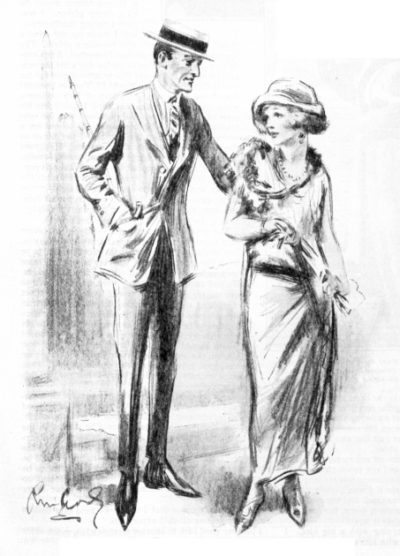 And at that instant behind a door at the end of the short hall a woman laughed low and happily.
And at that instant behind a door at the end of the short hall a woman laughed low and happily.
“Why,” exclaimed Milly, “that sounds exactly like Aunt Jude!”
Judith Todd, when she had left the house and her mother behind her, became as usual a thing with wings on her feet. She flew toward the Subway entrance, her dark eyes eager, her chin outthrust, her tall figure leaning forward as if the waiting to get there was intolerable. Sometimes she took a quick and happy look up at the sky, as a girl may who is hastening to meet a lover.
At Columbus Circle she came up to the surface and walked quickly across to a certain somewhat shabby studio building. Usually she could not reach it quickly enough; but tonight she passed the door twice, and finally stepped into the shadow of another doorway to have it out with herself. She told herself that tonight was not different from any other Tuesday or Thursday night, and she was a fool to be so excited. But all day it had hung over her, a prescience that this was the most important hour of her life. She longed for it and she dreaded it terribly. If it brought her disappointment, it would be no ordinary disappointment; it would mean the death of something in her without which her life would become merely an existence — hope. Tonight she realized that she had never really lost it — hope — and an undying belief in her own genius.
But tonight could kill them both, or it could turn them into strength and glory. She clenched her hands in the pockets of her old serge jacket and set her lips in their lines of endurance.
The colored boy in the elevator smiled at her and eyed the sprig of lilac in her buttonhole. She had taken it from the supper table and completely forgotten it until this instant.
“Looks like summer’s comin’,” he drawled.
She held the flower out to him.
“For luck,” she smiled.
Then at the top floor she went on down the short hall to the door behind which every Tuesday and Thursday night she came to life.
With her hand on the knob, she heard voices within. She shrank back. So, already it was here, the life or death of her hope, waiting there beyond the door. She had expected to have a half hour to herself, to quiet in work this sickening tremor of her heart. Well, nothing for it now but to harden herself for whatever verdict those voices in there would soon utter. She threw her head back defiantly and opened the door.
Three men were in the high, bare studio, standing about a long table. They turned toward her at the sound of her entrance, and one of them, a tall, thin man of forty, with quiet eyes and a sensitive mouth, came quickly forward to meet her. But she looked past him toward the table on which stood ten or twelve little figures, some of them still mere lumps of clay. Not even in this moment could she keep her eyes from them, the objects into which she had poured herself in delight and in suffering.
The tall man, John Richmond, followed her glance with understanding.
“You see, I got them back safely; and these gentlemen asked to meet you.”
He presented them, and at the name of one of them she flushed — Ybarra. She knew him by repute as a Fifth Avenue art dealer whose galleries were noted for the cleverest and most daring of the exhibitions. The second man stood a little without the circle of white light that beat down from overhead. He appeared to her as merely a little grizzled man, and the name, Mr. Purcell, meant nothing to her, until stepping toward the table and thus coming under the light, some feature or gesture arrested her attention sharply. She caught her breath and fixed her eyes on him in a startled stare. George Jean Purcell. She knew him now. She had seen him in his box at the opera one night. A girl sitting next to her in one of the topmost balconies had pointed him out. A fabulously rich man, and a discriminating collector. She had often longed to see the inside of the little white marble gem which was his private museum.
Something like terror invaded her. She had an impulse to gather them up in her arms, those bits of clay which were part of her, to protect them from the eyes of these two men who could command so much of the beauty of the world. She gripped the back of a chair, while a defiant glare came into her bright dark eyes.
The little grizzled man touched one of the clay figures. It was a study, a fantastic interpretation of a famous tenor in one of his most picturesque roles.
“You knew him very well, didn’t you?”
She smiled her fleeting, ironic smile.
“From the top gallery. Once I bribed an usher to let me into the dress circle.”
George Jean Purcell and Ybarra, the art dealer, looked at her sharply.
“My dear young lady,” cried Ybarra, “do you mean to say none of these people sat to you?”
“To me! Why should they? And, anyway,” she added, “I didn’t want them to sit to me. These are not portraits. They’re — bits of what goes on inside of me, I suppose.”
Ybarra started to speak, but Purcell held up his hand. He looked from Judith Todd to the bits of clay on the table. The tallest were perhaps fourteen inches, figures of famous men and women, of little shopgirls, of an ancient hag of a woman, of a blind mail, Fantastic, gay, sinister and pathetic, each one had its authentic breath of life. They had been done with the lightness of touch, the half-bitter whimsicality of a genius that is afraid of itself. And into them there had been poured the hunger and the rebellion of long repression.
George Jean Purcell shot a keen glance from under his gray brows at the woman who stood clutching the back of a chair, trying to keep defiance in her eyes. He noted the old serge suit, carelessly worn, the unfashionable hat; and over and beyond these details he observed the lines of endurance about her mouth, which could not obliterate its humor. He also saw the rather bitter keenness of her dark bright eyes.
“Spinster,” he thought; “iron-bound sense of duty; starving for proper soil to grow in. What miracle was it that let her do these amazing things?” And aloud he said, “How did you happen to wait until now?”
She looked as if she thought the question a little stupid.
“I never had time or a place to work in, where I could do as I liked.”
“You have ties, obligations?”
She smiled without bitterness.
“I have to make a living; and I have a mother with a weak heart, who can’t realize I’ve grown up.”
“You know you have genius?”
Her face became gay with a touch of impish humor.
“I know. It’s God’s little joke with me.”
Purcell chuckled grimly.
“You’re not giving anything away, young lady.” He offered his hand. “I’m going to leave you with Ybarra and John. They’ll tell you what I want you to do. And I hope, for the sake of an old man who treasures beauty wherever he can find it, you will accept their advice.”
Without another glance or word he walked briskly out.
The instant the door closed on him, Ybarra seized her hands with an exuberant Latin gesture.
“Congratulations, my dear young woman! I’ve never known old George Jean to go so far for native talent.”
She looked past him appealingly at John Richmond, her face white.
“What does he mean?”
John Richmond detached Ybarra and himself took her hands and looked into her eyes. “Judith Todd, it means the end of the long road; it means a fair chance at last. You know, don’t you, that when George Jean Purcell puts in an order for an artist’s work, he’s got a pretty canny idea that that artist has a future? Isn’t that so, Ybarra?”
“It has meant just that several times in the past.”
“Very well, that’s that,” said John Richmond. “Now, you’re to finish up a certain number of those figures — yes, yes, we know you can’t afford to have them cast, but Mr. Purcell will attend to that. In return you will sell him six that he chooses. I believe he gave you a check, Ybarra? Perhaps if she sees that she’ll believe us.”
But though they put in her hands the slip of pale-green paper with its figure which exceeded her earnings for a year in the novelty shop, she did not look at it. Instead, her burning gaze clung desperately to John Richmond’s face.
“You’re not fooling, are you? You wouldn’t be so cruel as that, would you?”
Richmond’s eyes blurred. He made a signal to Ybarra, and the dealer slipped out of the room, murmuring something about an engagement.
“Remember,” he said as he went out, “one of my galleries will be ready for your exhibition in the autumn.”
With the sound of the closing door, Judith Todd collapsed upon a chair. She was not the crying sort of woman; tears hurt her as they do a man; but now the floods rushed over her. All the years when she had borne the pain and the wonder of her gift alone, all the years when it had been denied, were in that flood. And John Richmond went down on his knees. He held her racked body close, murmuring his deep sympathy and understanding. But presently, when she had grown calmer, she tried to draw herself away, looking much ashamed.
“I’m a frightful fool, letting go like this; and I haven’t thanked you yet. If you hadn’t lent me this studio, if you hadn’t encouraged me — “
“Don’t, Judith! You know — I’ve told you — ever since that rainy Sunday afternoon in the Museum, when I saw you prowling around the Rodin things like a hungry ghost, and finally got up courage to speak to you because your face had such longing in it — ever since then I’ve believed in you.”
“Yes, you’ve believed in me,” she whispered, as if the wonder of it were something she could never fathom. “The first one to believe in me.”
“But more than that,” he went on in a low voice. “I’ve loved you.”
She shrank a little and put up her hand.
“No, no, that can’t be so! Look at me, a shabby old maid. I know! I haven’t got young nieces for nothing; and I’m considered a bit queer too. That has always been rubbed into me too. But it doesn’t matter now. You don’t need to think you love me, for I have so much now. A chance to work, unashamed — and your friendship. I — I shall be content with that; I don’t ask more than that.”
“Judith, don’t you know it’s a privilege to love you? Don’t you know you’re wonderful, in your courage and strength? Don’t you know you’re beautiful?”
All the light and amazement there was in the world seemed to be in her enormous eyes.
“It is too much,” she whispered, “to be offered love and fame all in one hour. I’m afraid. I’ve never been afraid before, but now I’m scared. I’m afraid of waking up.”
He drew her to her feet.
“Come and look at something real and you’ll know this is no dream.”
Together they stood beside the long table and bent over the little figures so vital and so gay, which were the soul of Judith Todd squeezed out of her by the drab discipline of the years, turning itself at the first touch of encouragement into these vivid and mordant fragments.
“How did you do it?” he cried. “How did you get underneath the surface like that, as if you had stripped off the smooth skin and seen what was rioting underneath, the ridiculous and sublime fantasy of the soul?”
It was then that she laughed, low and happily.
“Because I am like that — all smooth and gray on the surface, and underneath amazing — little colored worlds within worlds, always something dying and something else being born. No one ever is commonplace, underneath. Why, take my family — at the supper table we sit, a dull family in a narrow house in a Harlem street. But if you watch with patience and insight, you see worlds opening up behind each pair of eyes, longings, incredible dreams — ”
She stopped abruptly, her eyes fixed on the door.
“What is it?” he asked.
“I thought I heard my name. Wait, let me look. Someone out there — ”
She threw open the door. A sleek young man dropped his hand from the arm of a girl who sprang forward with a cry of the frankest relief, “Aunt Jude! I want to go home with you.”
The socks and stockings were all darned and they lay neatly folded in a ring around the darning basket. The evening noises in the street outside were stilled, and the narrow house in the Harlem street was quietly breathing, waiting. Alyse yawned, looked at the clock and put on her sad-colored hand-loomed hat. Another evening practically wasted. Of course, she had a sense of having done her duty, and it was nice to spend a peaceful evening with mother. But from the point of view of literature she had got nothing out of it. Families were mostly like that, nice as something to come home to occasionally, but utterly unstimulating to the imagination.
“Mother, do you suppose father could afford to send me to Russia — ”
And just there the telephone rang. It was her father, and he told Allie to tell her mother not to be worried if he was a bit late getting home. The fact was, he chuckled, he and Wally had got arrested.
“Arrested! Father! What for?”
“Well, you see,” he explained, “Wally bid on a package at the express-company auction, and we were taking it away down a side street, sort of dark, you know, when the darned thing dropped and broke. A policeman came snooping along just at that minute and he ran us in.”
“But why, why, father?”
“I guess he thought we were bootleggers, because Wally, for a joke, kind of helped it along, and — ”
“But what was in the package, father?”
“Well, that was a joke on us,” said George Todd, and she could hear his appreciative chuckle over the wire. “You see, there was two dozen bottles of hair tonic in that darned package.”
Alyse hung up the telephone with a disapproving face.
“You might know that if anything happened to father it would be something ridiculous,” she sighed.
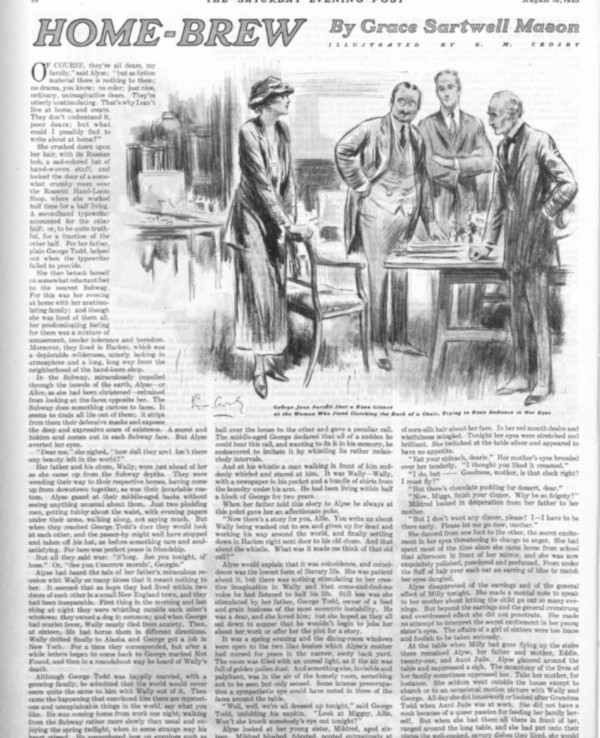
Illustrations by R.M. Crosby
May/June 2018 Limerick Laughs Winner and Runners-Up
So now we all know where he goes
When Santa seeks summer repose.
He trades in his sleigh
For artist’s beret
And paints with the grass ’neath his toes.
Congratulations to Michelle Gordon-Weedon of Airway Heights, Washington! For her limerick describing J.C. Leyendecker’s cover illustration for the May 26, 1934, issue of the Post, she wins $25 and our gratitude for a job well done.
If you’d like to enter the Limerick Laughs Contest for our upcoming issue, submit your limerick via our online entry form.
In no particular order, here are some of our other favorite entries to this limerick contest:
Said an elderly artist named Will,
“Painting nature is quite a big thrill.
The poses won’t last,
So I have to work fast
’Cause hummingbirds cannot sit still!”—Roger Blush, Irvine, California
My questions, I hope, won’t cause strife.
Is he ignoring the cute wildlife?
Is his nose red from drink?
And that sweater of pink …
Does it really belong to his wife?—Brian Federico, Clyde, New York
The animals witnessed that summer
A bearded and red-bereted plumber
Who sat at his easel
And painted a weasel
So perfectly — number by number.—Denis Feehan, Mesquite, Nevada
With butterflies, bluebird and doe,
Two bunnies complete our tableau.
Idyllic? You bet!
However, I get
Art critics wherever I go.—Steve Johnston, Peoria, Arizona
Well, this dwarf had the right to be mopey.
He again lost a film part to Dopey.
So he shed just one tear
As he cut off his ear.
You might know him: His name is Van-Gogh-pey.—Jennifer Klein, Jericho, New York
The painter applied his paint thick.
His brushwork was skillful and quick.
When the painting was done
He amazed everyone.
With a chuckle, he signed it “Saint Nick.”—Roy Skibiski, Lawndale, California
As the animals gather and stare,
He is sitting composed in his chair.
He is painting with ease
And enjoying the breeze,
But his painting is off by a hare.—Ryan Tilley, Altamonte Springs, Florida
As the animals gradually got bolder,
Painter’s temper had started to smolder.
He finally confided,
“I just can’t abide it —
You lot looking over my shoulder!”—Lisa Timpf, Simcoe, Ontario, Canada
For a masterpiece, Painter did strive.
The meadow, it seemed, came alive.
But the doe and the jay,
Concerned about pay,
Wanted time and a half after five.—Jon VanGutman, Olivehurst, California
North Country Girl: Chapter 59 — Of Magazines and (Naked) Men
For more about Gay Haubner’s life in the North Country, read the other chapters in her serialized memoir.
Some names have been changed.
My artist lover, Michael, and I were broke newcomers to New York City, about to move into an apartment we weren’t sure we could afford. I thought I could go back to waitressing — the most lucrative job I had ever had — but not a single restaurant would hire someone who had no experience in the hectic New York dining scene. Even McDonald’s probably would have shown me the door. My resumes and cover letters to magazines got the same non-response. I had swallowed hard, screwed up my courage, and cold-called a name I had gotten from the editor of Oui, Gerald Sussman. Now I had an appointment with Gordon Lish at Esquire.
As a freelance writer of fripperies and pornography for Oui, a second-tier men’s magazine, I knew as much about magazine publishing as I did about the oil industry. I had no idea that struggling Esquire had just been bought by Clay Felker, who had made a huge success of New York magazine. Everyone in New York but me knew that big changes were coming to Esquire, and it was probably the world’s worst timing to pursue a job there. I also had no idea who Gordon Lish was: the pre-eminent fiction editor of the day, the man who invented Raymond Carver and discovered Richard Ford, Don DeLillo, and Cynthia Ozick.
The Esquire offices in midtown were a dim, dusty, rambling warren. There was none of the bustle and laughter and loud coarse jokes of the Oui offices, just murmurs behind closed doors. The carpet, the walls, and the torn leather chairs in the reception area were uniformly brown. Translucent glass fixtures tried to dispel the gloom, but the only thing that reflected light was the gilt lettering that read “Gordon Lish Fiction Editor” on the glass panel of his door. Mr. Lish ushered me into his small office, which like our sublet apartment, overlooked an airshaft. Crammed on shelves and across his desk and covering the floor were hundreds of books, interspersed with magazines, newspapers, and typed manuscripts held together with brass paper fasteners.
I thought Gordon Lish looked incredibly old; he had pale longish hair and deep parentheses around his mouth and a sweetish scent that reminded me of my grandfather. We shook hands, I shifted a few books off a chair and sat down, and passed him my resume and my writing, née modeling, portfolio.
Mr. Lish turned the crackling acetate pages slowly, looking thoughtful and taking intermittent swigs from a silver flask.
“Ah, the female body has truly unending variations of beauty,” he sighed. He gently touched the tip of his index finger to one photo of an especially pretty girl with especially large breasts. Wait, I thought, he isn’t reading a word of my copy, he’s just looking at the photos!
I suddenly realized that even at Esquire, the birthplace of the Vargas girl, my writing clips featuring nude women playing volleyball, making spaghetti sauce, and riding unicycles were highly inappropriate and, even worse, unlikely to get me a job. But if I threw out all the nudes and made my writing portfolio G-rated, I would be left with five or six paragraph-length captions to funny news photos and a handful of 150-word book and album reviews.
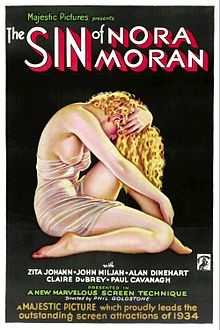
Mr. Lish closed my portfolio with another sigh. “So Gerald Sussman sent you. Pompous twit. I never could stand that man. Would you care for a drink?” Mr. Lish passed me his flask. I took a small sip of what I recognized as Scotch whiskey, trying not to choke on its doused campfire taste.
“Let’s get out of here before I have to hear any more dreadful news. A lunch interview, hmm?”
There was no interview and there was no lunch at the Spanish restaurant Mr. Lish took me to. There was a small half-moon bar, where Mr. Lish and I sat for three hours, and there was a dark, silent bartender in a white jacket who refilled our drinks without asking. There was also a Chivas-fueled monologue from Mr. Lish on the perfidy and consummate evil of Clay Felker, the disgusting decline of magazine and book publishing, the idiocy and ineptitude of all publishers and most executive editors, and the ingratitude of the writers he had made famous, none of whose names I recognized.
By some miracle, the Spanish restaurant Mr. Lish and I got drunk at was on Greenwich Avenue, a few blocks from my miniature apartment. When I realized it would be death if I had another drink, I thanked Mr. Lish, who waved me off, and I staggered home.

The next day at noon, the apartment phone rang.
“Gay, it’s Gordon Lish,” whispered Michael as he handed me the phone.
Oh my gosh, I thought. He’s going to offer me a job!
“I’m at La Casa des Borrachos. Come have a drink with me.” And nitwit that I am, I met him at the bar of that Spanish restaurant. At least this time I covered my glass with my hand when the bartender approached, but I still had to listen to pretty much the exact same litany of injustices Mr. Lish had related the day before. Because I am a slow learner, I met him there a third day, before I finally realized that there was no job for me, and there probably would be no job for Mr. Lish either if he kept spending his days drinking at a bar. On the fourth day I made Michael answer the phone and say that I wasn’t there.
The next phone call for me came from Bernie Exeter, the managing editor of Viva magazine; he had read my resume and asked me to come in for an interview.
I was excited, but not surprised. Mindy, my clairvoyant friend, had predicted my move to New York and reunion with Michael and that I would get a job at Viva magazine. And I knew that I still had my best good fairy gift, my incredible luck. An interview at my favorite magazine seemed like nothing more than my fair due, what the world owed me just for showing up.
Like Mindy I was a big fan of Viva, the sister magazine to Penthouse, created to appeal to an imaginary female counterpart to the male Penthouse reader: a woman who was worldly, curious, sexually liberated, independent, adventurous, fashion crazy, and a drinker and smoker with a sizable disposable income. “The world’s most sophisticated erotic magazine for women” was Viva’s claim, which, when translated meant “We think women like to look at pornography too.”
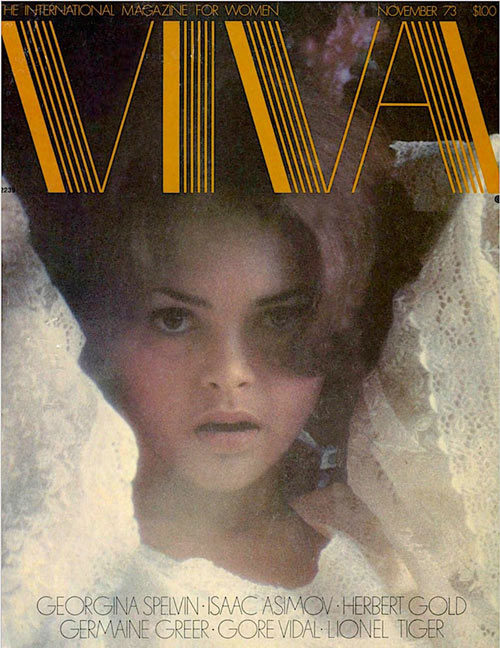
I had been a faithful reader for years, gazing at clothes I couldn’t afford and admiring makeup I had no idea how to apply. There was lots of erotica; Anaïs Nin and her racy diaries managed to make it into every other issue. I appreciated Viva’s almost realistic attitude to sex, as opposed to the coy tips offered by Cosmopolitan, or the way Glamour and Mademoiselle magazines approached sex, which was hardly at all. But I shuffled through Viva’s pages and pages of steamy photos of amorous couples that were supposed to be titillating with barely a glance. It was hard not to laugh at those buff, handsome men and pretty, large-breasted women in tender embraces, lips pouted, limbs entwined, eyes rolled upward, everything screaming fake, fake, fake. To me the photos were not erotic at all; the only thing that crossed my mind was, “I wonder how much the models were paid?”
The morning of my interview, I pored through that month’s Viva and tried to commit the articles and writers to memory; I was going to wow Bernie Exeter with my knowledge of the magazine. Then I tore through my still packed suitcases for interview attire that said erotic sophisticate. I stupidly chose a Kenzo ensemble purchased back in Chicago from the car trunk clothes dealer: a lavender tunic that tied at the shoulders, worn without a bra but with white harem pants.
Bernie Exeter seemed a bit taken aback at me and my louche outfit when he came to fetch me from the Penthouse lobby, which except for the oversized posters of Penthouse covers, was as grey and anonymous as any insurance or accounting firm.
Bernie Exeter looked like a mustachioed, homelier Chuck Barris. He was wearing a short-sleeved polyester shirt, yellow knit tie, and pleated pants. He led me to his office overlooking the Roosevelt Island tramway, and I handed him my unexpurgated portfolio. I wasn’t worried that I would shock him with my R-rated writing samples; Viva was full of breasts, as well as other body parts. Bernie flipped through the pages for all of ten seconds then slapped the portfolio closed and looked at me. I had no idea what kind of questions he would ask; my last job interview had landed me in the coat check.

“What do you know about the magazine?” he asked, and then, before I had even opened my mouth, he started in on the rise and fall of Viva.
Viva was officially the brainchild of Penthouse owner Bob Guccione and his girlfriend, Kathy Keeton. (Whenever Bob was not around, Kathy insisted that she had thought up the idea for Viva all by herself, which was probably true; Kathy was the fox to Bob’s hedgehog). Bob Guccione was busy lying to, seducing, and taking nude photos of silly young girls and buying Old Masters, Impressionist, and Modern paintings by the crate with the deluge of cash generated by Penthouse magazine. This left Kathy in charge of the new-born Viva, as publisher and executive editor. Under her guidance, and with Bob’s money, Viva enjoyed a few years of success. Write a big enough check and you can get Helmut Newton photographs and Joyce Carol Oates stories to run alongside of shots of bare-chested, smoldering firemen stroking their hoses. A few daring advertisers bought pages and a few desperate starlets posed for the cover, despite Viva’s association with the beyond-the-pale Penthouse. Thousands of young women signed up for subscriptions; a lot more, like me, with my constant lack of a fixed address, bought our copies on the newsstand. Viva’s first print run was a record-breaking 1,002,000 issues.
Kathy Keeton would never have called herself a feminist, but she was a firm believer that women had as much right as men to look at naked photos of the opposite sex. When Bob’s camera started focusing in closer between the spread legs of those silly girls, Kathy set her sights lower too. She decided that the Viva reader was entitled to look at the Full Monty. Kathy was going beyond Viva’s coquettish “love sets” where the male member was always coyly covered by a feather boa or chiffon scarf, beyond the teasing photos, like those of Joe Namath and Burt Reynolds in Cosmopolitan magazine, where the men had one leg demurely cocked forward, as unsexed as a Ken doll.
I was familiar with this part of the story, having bought the issue of Viva that proclaimed “First Penises Ever!” though not for that reason. Maybe Kathy Keeton enjoyed looking at photos of penises. I didn’t especially, and I thought of myself as the epitome of the sophisticated Viva reader. I continued to buy the magazine, flipping quickly past the beefcake with their strangely flaccid penises to get to an article about the world’s sexiest perfumes or a short story by Tom Wolfe.
I was alone in my nonchalance about male nudity. Viva, Bernie Exeter told me, went from overnight success to being on life-support, a pariah among publications. Readers canceled their subscriptions in droves. Newsstands refused to carry Viva, even if the offending magazine was safely swaddled in plain brown paper and hidden away under the counter. Those companies that had been okay advertising in a magazine that ran stories such as “My First Orgy” and “The Good News about Rape” blanched at penises; the only advertisers that had stuck with Viva were cigarettes and a few brave liquor companies, most of whom had gotten their ads highly discounted or free with their purchase of exorbitantly expensive pages in booming Penthouse magazine.
For a few months, Kathy Keeton clung to her X-rated vision of Viva, until the head of advertising sales, Beverly Wardale, a booming Brit in the Margaret Thatcher-She-Who-Must-Be-Obeyed mold, informed her that either the penises went or she did. Kathy Keeton would have brushed off a threat from a lesser mortal, but Beverly was also her best friend. The penises went with zero fanfare, but Viva could not shake its bad reputation.
“’Cause what are you going do?” asked Bernie, “Run a cover line that says, ‘No more penises?’” I shrugged, not knowing the answer; I was busy trying to figure out where this was going and if there was a job for me at the end of it.
“But that’s all changing,” said Bernie, rubbing his hands together. “We’ve got a new editor, she’s a smart cookie, and you’re going to see some feminist articles, and the subscription department’s come up with some neat umbrellas and t-shirts to give away — here, take one.“ Bernie tossed me a tiny white tee with a hot pink “Viva” printed in a hideous fake Art Deco font. Within a year, every other bag lady in New York City would be wearing one of those shirts.
“Well,” said Bernie Exeter, “Do you want the job?”
“I do, I do.…Um, what is the job?”
8 Other Things That Happened on the Fourth of July, and One That Didn’t
Independence Day is such an institution in the United States that when we hear “Fourth of July,” many of us think of it first as the name of a holiday and not simply — as it is in so many other countries — a calendar date. Considered the birthday of America, the holiday commemorates the adoption of the Declaration of Independence in 1776, but in the more than two centuries since, it isn’t the only notable event to have happened on that date.
Here are eight other things that happened on that day, plus one thing that surprisingly didn’t happen on the Fourth of July.
1. 1802: The Military Academy at West Point Opens for Instruction
What began as fortifications at the mouth of the Hudson River in 1778 is now the oldest continuously occupied military post in the U.S. In 1802, President Thomas Jefferson signed the Military Peace Establishment Act into law, which in part established a new U.S. Military Academy at West Point whose primary purpose at the time was to train expert engineers. On July 4 of that year, the new academy formally opened for instruction.
Ulysses S. Grant and Robert E. Lee were both West Point graduates, as was Confederate President Jefferson Davis. West Point grads played a big role in the U.S. military during World War II: General George Patton, General Douglas MacArthur, and General (later President) Dwight D. Eisenhower were all alumni.
West Point grads have distinguished themselves outside the military, too. Other successful alumni include astronaut Edwin “Buzz” Aldrin, Pittsburgh Steelers left tackle Alejandro Villanueva, and Duke University head basketball coach Mike Krzyzewski.
2. 1817: Construction Begins on the Erie Canal
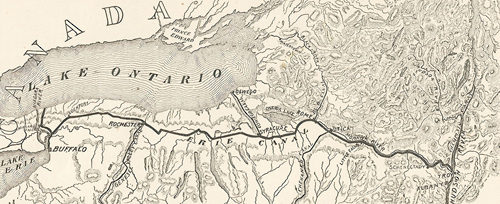
It took eight years for engineers and laborers to create the 4-foot-deep, 40-foot wide, 363-mile-long canal that would connect Albany and the Hudson River to Buffalo and Lake Erie. But it was worth it: This massive public works project opened up travel to the west and was a key influence in turning New York City into America’s principal seaport and a center of business and finance.
In 2000, the U.S. National Parks Service designated the Erie Canalway National Heritage Corridor.
3. 1826: Thomas Jefferson Dies
It seems a poetic justice that the man most responsible for writing the Declaration of Independence should die on the 50th anniversary of its adoption. Though his exact cause of death at age 83 is unknown, his health had been in steady decline since 1818.
4. 1826: John Adams Dies
The second and third presidents of the United States died within five hours of each other. Though they fought side by side to create a free America, after they had achieved that goal, they discovered they had very different ideas about what these new United States should look like. They became bitter political rivals for decades, only rekindling their friendship later in life.
It’s a part of American legend that the 90-year-old John Adams’ last words were “Jefferson still survives,” not knowing that the younger man had passed earlier that day, but the veracity of this legend is questionable.
5. 1845: Henry David Thoreau Moves to Walden Pond
The American transcendentalist began his two-year experiment in simple living on the Fourth of July. On that date, he moved into a small cabin he had built himself on the shores of Walden Pond, near Concord, Massachusetts, on land owned by fellow philosopher Ralph Waldo Emerson. In 1854, he published his record of the experience in Walden, or Life in the Woods to moderate success.
6. 1855: Leaves of Grass published
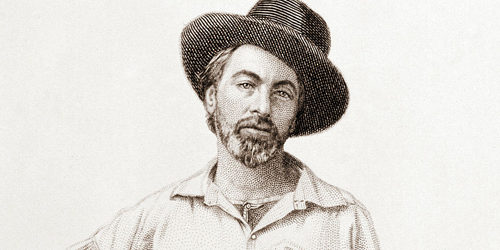
Though the 795 copies of the first edition of Leaves of Grass — which Walt Whitman designed and published himself — included only 12 poems over 95 pages, it changed the course of poetry in America for good. Whitman added, revised, and republished his poems throughout his life so that, by the time he died and after several editions, Leaves of Grass contained 389 poems.
7. 1939: Lou Gehrig’s “Luckiest Man” Speech
On May 2, 1939, New York Yankees first baseman Lou Gehrig ended his record-setting streak of 2,130 consecutive games by benching himself for poor play. He would never play again. A month and a half later, he was diagnosed with amyotrophic lateral sclerosis.
On July 4, the Yankees held Lou Gehrig Appreciation Day in a sold-out Yankee Stadium. Gehrig, who was petrified of crowds, wasn’t originally expected to speak, but such an outpouring of love pushed him to it. That afternoon, he stepped up to the mic and delivered his “Luckiest Man” speech, which is still considered one of the most moving speeches ever given at a sporting event. In it, he acknowledged not only the fans and the other players, but even the groundskeepers and his own mother-in-law.
8. 1997: Pathfinder Lands on Mars
After a six-month journey, the first Mars Pathfinder landed on the Red Planet on July 4, 1997. It became the base station for the free-range robotic rover Sojourner — Earth’s first (successful) interplanetary rover. NASA received its first picture of Mars at about 9 p.m. that day.
Pathfinder and Sojourner collected 2.3 billion bits of data during their lifespan and sparked two decades of Mars exploration. Though the mission was only supposed to last up to 30 days, NASA continued to receive data for 83 days.
Not on the Fourth of July: The American Colonies Declare Independence from Great Britain
The members of the Second Continental Congress voted 12-0 with one abstention (New York) on a motion to officially separate the American colonies from British rule on July 2, 1776. By July 3, two Philadelphia newspapers, the Pennsylvania Evening Post and the Pennsylvania Gazette, were already reporting that “the Continental Congress declared the United States Colonies free and independent States.” That same day, John Adams wrote home to his wife, Abigail: “The Second Day of July 1776, will be the most memorable Epocha, in the History of America.” Adams believed the Second of July, not the Fourth, would become a national holiday.
What we celebrate now as Independence Day marks the day in 1776 when the final edited version of the Declaration of Independence was adopted by the Continental Congress, though the final signatures on it wouldn’t be collected until early August.
North Country Girl: Chapter 58 — Jobless in NYC
For more about Gay Haubner’s life in the North Country, read the other chapters in her serialized memoir.
My second Michael, my second true love, had tossed me to the wayside; I was too much baggage for him to handle on his pilgrimage to New York City in pursuit of his art. I was rescued by my Minneapolis pal Mindy, who had been my travel companion on that fateful Spring Break in Mexico.
After years dedicated to serious partying, Mindy had finally given herself a good shake and found her way back to college; she was taking classes during the day and waitressing at night. Mindy’s roommate was gone for the summer, so I would take over her tiny bedroom until she came back.
I dropped my two suitcases holding all my worldly possessions, fell into Mindy’s arms, and had a good cry. Mindy blotted my face with her waitress apron and said, “It will be fine. You will be fine. No more crying.” I gave her a trembling smile as she headed out to work and ordered myself to do all my heart-broken sobbing in bed or in the shower, anywhere Mindy couldn’t hear me and pity me.
Most of the time Mindy was gone, off to class and work, and I was left alone in her small but light-filled apartment. I spent my first days sprawled weepy on the couch, all the more sorry for myself that I didn’t have a single one of Michael’s blues albums to listen and cry to, songs of betrayal and abandonment, of false-hearted lovers, songs that would let me wallow in my sorrow. Eventually I gave myself a good talking-to and ventured out into the only thing that could soothe my ruptured soul, my favorite thing in the world: a Minnesota summer, balmy languid days that last till nine, when the sun finally says good night and sinks away.
Mindy lived a short walk from my beloved, glorious Lake Calhoun (now known as Bde Maka Ska), a just-right-sized expanse of sky blue water dropped in the center of Minneapolis. Lake Calhoun was surrounded by the softest grass, the leafiest trees, and had a tiny sandy beach with a lifeguard chair, rowboats to rent, and a snack bar.

I could have registered for fall classes at the University of Minnesota, I could have looked for a job, but I was mesmerized by summer, as sweetly familiar as a favorite childhood book and as fleeting as a dream. Chicago summers had been all sweat and steam and stink; here in Minneapolis I could dip in the lake during the day and slip into a sweater at evening.
I read whatever magazines and books were lying about Mindy’s apartment, swam in Lake Calhoun, and tanned on that little stretch of sand, lunching on Popsicles from the snack bar. I watched couples making out on blankets and cried as only a jilted young lover can cry. I made sure there were chips and bread and cold cuts and six-packs of beer in Mindy’s fridge, and ignored my dwindling savings that I had no prospects for replenishing. I waited for the phone to ring.
The phone did not ring, but a three-page letter from Michael arrived. Most of it was on the wonders of New York City: The art museums, the Modern, the Guggenheim, the Whitney, and the Metropolitan where you could pay just a penny to get in. The subway, which, unlike Chicago’s El, actually took Michael everywhere he wanted to go, once he figured out the confusing lines and local versus express stops. The dozens of different languages Michael delighted hearing on the street every day, the sneaky thrill he got eavesdropping on the German or Russian or Yiddish speakers. His sublet’s neighborhood of Greenwich Village, where there were jazz and folk and blues clubs, and outdoor cafes on every corner.
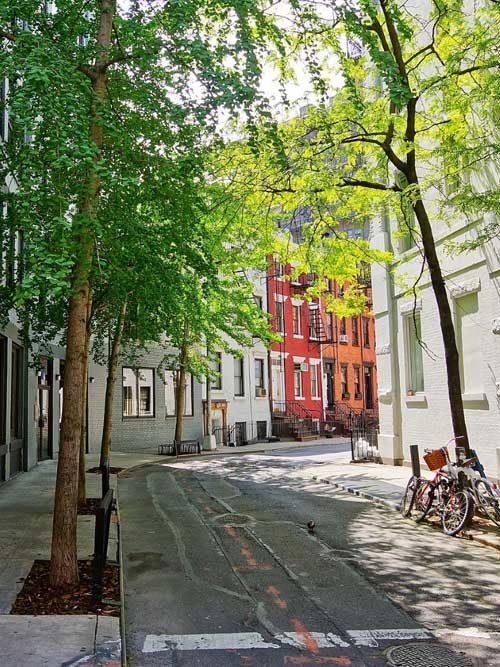
It was the Summer of Sam, the summer of the Bronx burning, of the hot August night of blackout and looting, the summer New York City teetered on the edge of bankruptcy. Michael was oblivious to the dangers, the dirt, the looming disasters. “You would love New York,” Michael wrote, “and I miss you so much.”
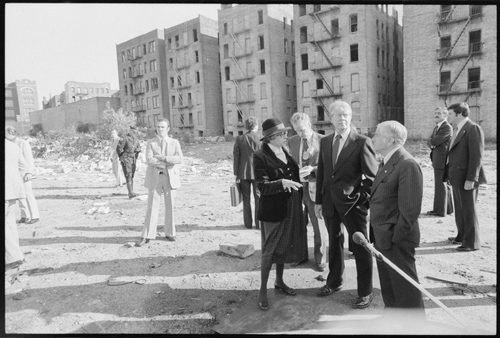
I wrote back, mostly about how much I missed him, as I had no other news outside of what flavor Popsicle I had eaten for lunch. Our letters criss-crossed the country, full of love and longing. I read Michael’s letters aloud to Mindy, always a sympathetic ear, on the few nights we spent together. She sipped the beer I gratefully supplied and flipped through the magazines she never had time to read.
“You’re going to New York,” Mindy assured me. “Wouldn’t it be cool if you got a job here?” and she held up the latest issue of Viva magazine, with the pouting face of minor starlet Barbara Carrera on the cover.
As Mindy predicted, the long-distance call and the summons to New York finally arrived. I heard Michael sniffling, he had a catch in his voice. “I am so sorry, I don’t know what I was thinking of, I love you, I want to be with you, please come to New York. The place I’m staying in is really small, I’ll find someplace for the two of us, it’s going to be great, please say you’ll come.” A tsunami of joy washed over me and I started to cry too. I had missed Michael dreadfully. For weeks my mind and heart had been unmoored, drifting through the dark seas of rejection and loss. Now I was rescued, swimming toward a lifeboat of love, Michael holding out his hand to pull me in.
I opened my pink Samonsite suitcase to pack up the bikinis and cutoff jeans I had been living in, and there on the top was my modeling portfolio. I leafed through the acetates holding the garishly lit and cheaply printed photos of me in surgical scrubs or lounging on a hideous “Rent-to-Own” plaid couch or eating a McDonald’s Filet-O-Fish, my own mouth gaping like a bass, and knew I had zero chance of finding modeling work in New York. I had to get a job, and the two skills I had were waitressing and magazine writing.
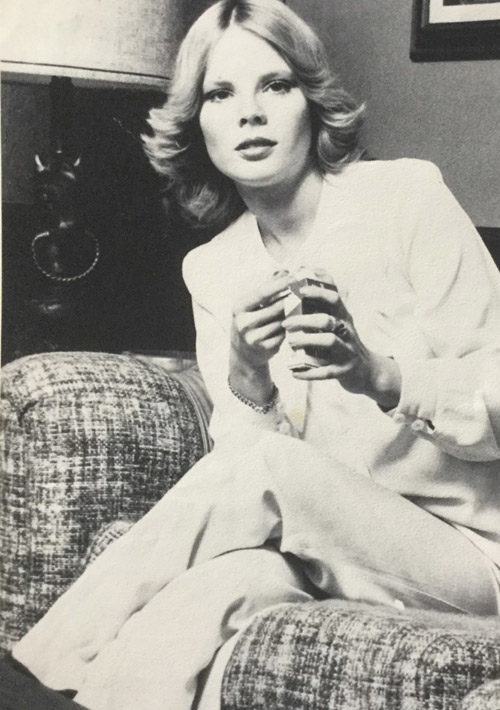
Under my modeling portfolio was a manila envelope with everything I had written for Oui. I sat on the floor and replaced all the photos of me with these short humor pieces and girl sets, placing the few that carried my byline at the front, and the most titillating girl-on-girl photos at the back of the portfolio.
A silvery bell of an idea popped into my head. I picked up the phone and called Los Angeles, mentally promising Mindy a few extra beers. I got my old Oui editor, John Rezek, on the phone and made quick work of the how-are-you small talk; it was long-distance daytime rates and I really didn’t care how much progress had been made on his epic poem about the first dog in space.
I said, “I’m moving to New York. I want to find a job at a magazine. Do you know anyone I can send a resume to?” John didn’t. He had never worked in New York. But Oui editor Gerald Sussman had, and he was standing right there. John put Gerald on the phone.
“Hi Gay, yeah listen, give Gordon Lish at Esquire a call. We’re great friends. Just mention my name and he’ll see you, help you out.”
Gerald’s connection at Esquire, the same magazine that had lured Michael to New York, was a good omen, a blessing on my next move to Greenwich Village and into what had to have been the Guinness World Record’s smallest studio apartment. It was in a brick building on West 10th Street, which confusingly runs perpendicular to West 4th Street. Michael’s sublet was a single room that held nothing but a convertible couch; we when unfolded the bed (which we did immediately) it took up the entire space, wall to wall. The bathroom had a shower, sink, and toilet you had to sit on sideways if you wanted to close the door. The kitchen was an alcove where a half-size two-burner stove and dorm fridge huddled against a sink, lit dimly by the apartment’s only window, which had never been washed and overlooked an airshaft. It was still the perfect cozy nest for reunited lovers, but if two people had to share it indefinitely, there would be knives at the throat. Michael said, “It’s just till the end of the month, then we’ll move into a bigger place.”
In the still light and sultry September evening, Michael walked me up Eighth Avenue to Chelsea, which was all bright, cheap Cuban-Chinese restaurants, a long-gone cuisine that specialized in ropa vieja and fried rice. All along the side streets, card tables, folding chairs, and wooden crates were set up for what Michael told me were never-ending domino games; each game had twice as many kibitzers as players. We turned left on 20th Street and threaded our way through the domino tables to the middle of the block. Michael held me by the shoulders and placed me on the far right of an iron gate to peer inside past the grey stone front building. “See the courtyard?” he asked. “We’ll be living in the carriage house in the back. It’s called a mews.” Carriage houses and mews sounded so romantic we had to hurry back to the love nest, promising ourselves that we would come back to dine at La Tas de Oro or Mi Chinata as soon as we could afford it.
Financially, we were running on fumes. I had left Chicago with $800, which had been drastically reduced by thank you groceries for Mindy, rowboat rentals, snack bar Popsicles, and a plane ticket to New York. Michael was broke; landing that Chelsea apartment (monthly rent $400, the same amount as James’ luxury high rise back in Chicago) had required two months’ security, plus electricity, phone, and cable, which Michael had balked at until he discovered that no television in Manhattan could get reception without it, and Michael needed old movies and the National League.
The day after our lovely, loved-filled reunion, I invested in a stack of likely magazines and a ream of typing paper, balanced my trusty Smith Corona on my knees, and started sending resumes and cover letters out into the void, addressed, as John Rezak had advised, to each magazine’s managing editor. While I typed, Michael perched next to me on the folded-up couch, drawing board across his lap, cross-hatching an illustration for the next Harry Crews column; this would bring in $250, which was exactly what Michael had to pay out in child support.
“I’ll waitress,” I told Michael. “I’ll waitress until I get a real job,” positive that within a month or two I would be snapped up by a magazine. It turned out that it was harder to get a waitress gig than land a job in publishing. Every Greenwich Village bar and restaurant recognized me on sight as a non-New Yorker, and therefore a rank amateur. I never even got to fill out an application. The manager would say, “Where was the last place you waitressed? Minneapolis?” as if my last job had been slinging goat curry in Karachi. I was even rejected at every single one of the Village’s coffee shops, whose owners thought delivering a fifty-cent cappuccino to a table was beyond my capabilities.
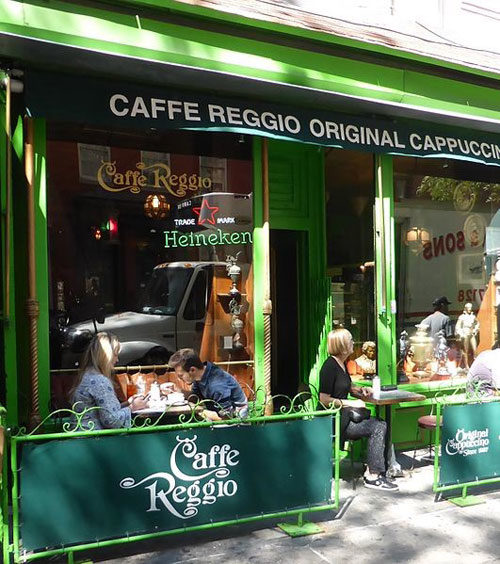
It took me a week of non-responses to my resumes and being given the bum’s rush at bars before I worked up the desperate nerve to cold call Gerald Sussman’s friend. I gave myself a pep talk: I could do this. I had banged uninvited on the doors of dozens of photographers. I had threatened a receptionist with a can of Reddi-Whip. I had smuggled drugs from Mexico! I could phone a perfect stranger and ask him for a job. I called Esquire and was connected to Gordon Lish, who like everyone else in the world back then, picked up his own phone. “Hello?” said a plummy voice. I took a deep breath.
“Hello Mr. Lish, my name is Gay Haubner and I was a writer for Oui and Gerald Sussman told me to call you to see if I could interview for a job at Esquire.”
I sounded like a squeaky cartoon mouse rushing through a nursery rhyme at a recital.
“Well,” Gordon Lish drawled. “Then I better see you. Come up tomorrow at eleven.”
News of the Week: The Sounds of Summer, Ghost Towns, and 10 Recipes (Yes, 10!) for Onion Rings
Beep! Crack! Vrooooom!

I don’t have air conditioning in my apartment, so in the summer I keep my windows open all the time. I live in a neighborhood with a lot of businesses and traffic, not far from both downtown and the highway. That means, unlike during fall and winter, every sound that happens outside, I hear in my apartment. I hear the big rig trucks as they go past my windows, the cars speeding through the intersection, the fire trucks, even people as they walk by and engage in conversation (something that can get rather boisterous on a Friday or Saturday night after they’ve had plenty of liquid refreshment). Oh, and a lot of car horns. Right this moment, there’s a guy in a Toyota in front of my building with his hand on the horn, impatient about something or someplace to go.
We always think of the differences in seasons only when it comes to weather (a crack of thunder almost made me jump out of my shoes a couple of nights ago), but what we hear is different too, and summer brings its own sounds, whether it’s a baseball meeting a baseball bat, the music of a Ferris wheel, or the march of a parade going by. I don’t mind the sound of any of those things, because unlike car horns, they’re associated with happy things. But all I can think about on this first full day of summer, the day when the kids are ecstatic and everyone’s thoughts turn to warm temps and shorts and barbecues, is that I can’t wait until the day a few months from now when I close my windows and everything gets a little quieter.
I could write about the smells of summer too, but I’d rather not think about those.
Hey, Let’s Buy a Town
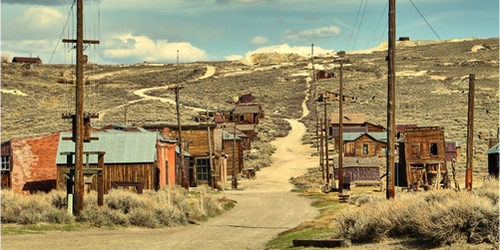
Do you have an extra $925,000? Have I got a ghost town for you.
Cerro Gordo, an abandoned mining town in California five hours north of Los Angeles, is for sale. It was founded in 1865 (the year Lincoln was assassinated) and was once the state’s largest producer of silver and lead.
You get 314 acres of land, plus 22 buildings, including a hotel, a saloon, and a chapel. You can shoot your own westerns there, or if you’re really rich (which I assume you are if you’re spending almost a million dollars on a town), you could fix it up and actually make it a non-ghost town again, one were people live and work. Imagine owning a town!
We could start a GoFundMe page for it. Who’s in? We could rename the town “Postville” or “Rockwell.”
Abraham Lincoln for Sale
Ghost towns aren’t the only historic things up for sale. Several of President Abraham Lincoln’s items are on display at the Lincoln Presidential Library and Museum in Springfield, Illinois, and many of the 1500 artifacts, including his hat, gloves, and pen, might be put up for auction to help pay off the museum’s loan debt. Needless to say, not everyone is happy about it. Here’s the story from CBS This Morning.
Corresponding for 40 Years … Via Cassette Tape!

I’ve talked many times here about old-fashioned correspondence and communicating with friends and family in ways that don’t involve a smartphone or social media. I was talking about handwritten letters and using the landline telephone. Not for one second did I ever think that people still corresponded via cassette tape.
That’s what these two Massachusetts women have been doing for 40 years. They started it after one of the women moved away (and to bring this back to something I mentioned above, they started it the day Elvis Presley died, August 16, 1977). Sure, they could use email or texts, but why stop something fun you’ve been doing for over four decades, where you can actually hear each other’s voices and keep up a tradition?
I’m all for this. The only question I have is, where the heck do you buy cassette tapes? I think I know where to get typewriter ribbons more than I do cassette tapes.
RIP D. J. Fontana, Matt “Guitar” Murphy, and Georgann Johnson
J. Fontana was Elvis Presley’s drummer. He played on such classic songs as “Hound Dog,” “Don’t Be Cruel,” “Heartbreak Hotel,” and “Jailhouse Rock” and appeared with Elvis on The Ed Sullivan Show and the famous “68 Comeback Special” in 1968. He died last Thursday at the age of 87.
Speaking of Elvis, here’s Bill Newcott on a new DVD set of the King’s best movies.
Matt “Guitar” Murphy was another music icon, a legendary blues musician probably best known for his work in The Blues Brothers. He also played with such people as Muddy Waters and Howlin’ Wolf. He died last Friday at the age of 88.
Georgann Johnson was a veteran actress who had regular roles on Dr. Quinn, Medicine Woman, and Mr. Peepers (she played Tony Randall’s wife). She also had roles in movies like Midnight Cowboy, Shoot the Moon, and the classic nuclear war TV movie The Day After. She also appeared in many Broadway productions. Johnson died June 4 at the age of 91.
Quote of the Week
“Not very tall. Or big. Just sayin’. I kinda liked it. Sort of.”
—a reviewer of the Great Wall of China, one of the quotes in this smart New York Times piece about the world of negative online reviews
This Week in History
Stan Laurel Born (June 16, 1890)
My favorite story about Oliver Hardy’s partner involves Dick Van Dyke. He accidentally came across Laurel’s number in the phone book one day. It was a long shot that it was actually the Stan Laurel, but … it was! He was living in an apartment in Santa Monica. Van Dyke and Laurel talked on the phone and became good friends. Van Dyke even gave the eulogy at Laurel’s funeral in 1965.
Statue of Liberty Arrives in New York (June 17, 1885)
Here’s what Lady Liberty looked like when she arrived at New York Harbor (click through to see the enlarged photos on Twitter):
#OTD in 1885, the Statue of Liberty arrived at the New York Harbor. Designed by French sculptor Frédéric Auguste Bartholdi, this massive copper statue became a symbol of freedom and opportunity to immigrants arriving from overseas. #oldestallies #fromthearchives pic.twitter.com/8AxscAxouz
— French Embassy U.S. (@franceintheus) June 17, 2018
This Week in Saturday Evening Post History: School’s Out (June 21, 1958)
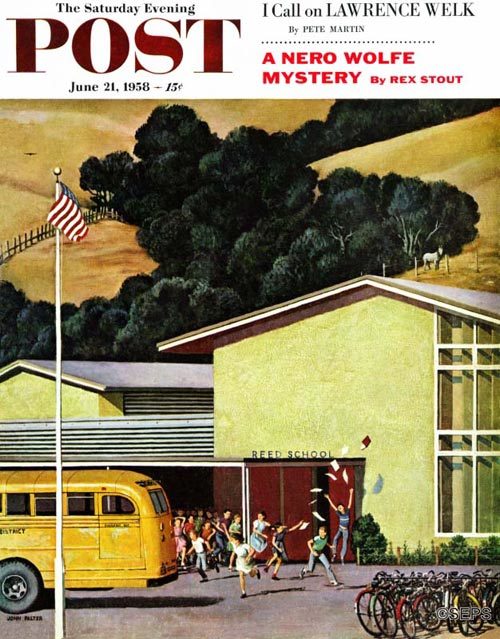
John Falter
June 21, 1958
I love the composition John Falter has here. He could have concentrated on the kids in close-up, their faces locked in big smiles. But he decided to do it from a little further away, capturing the school’s flag, the bus, and the bikes in the rack. If you look closely, you can see one of the kids throwing papers in to the air in celebration.
By the way kids, it’s already June 22. Enjoy the summer now, because you’ll be back in school before you know it!
Post Writers You Should Read
On the cover above is a Nero Wolfe story by Rex Stout, titled “Murder Is No Joke,” which was serialized in the Post in three different issues: June 21, June 28, and July 5, 1958. The story was later retitled “Frame-Up for Murder” and was part of the novella collection Death Times Three, released in 1985. You can read it for free at the Internet Archive.
After two films and several radio adaptations, there were two different TV shows based on Nero Wolfe, one a short-lived A&E series starring Maury Chaykin and Timothy Hutton and the other an even shorter-lived NBC series starring William Conrad and Lee Horsley, as well as various TV movies and pilots that never went anywhere, including one that was supposed to star Orson Welles.
Today Is National Onion Rings Day
Onion rings are a summer food, right? You can get them everywhere, but I associate them with carnivals and amusement parks, something you have along with fried dough and corn dogs and cotton candy on a stick. Something in a box you hold in your hands as you walk around the fairgrounds, looking for the next game to play or ride to ride.
They come in two distinct varieties: crunchy and wimpy. The crunchy are thick and crispy and really hold up. The ones I get in a local restaurant are thin and limp and just not the same (though they sure are tasty). Of course, you can make your own at home, too. Here are ten recipes — some with eggs in the middle and some wrapped in bacon — from the National Onion Association.
On a related note, yes, there is a National Onion Association.
Next Week’s Holidays and Events
International Body Piercing Day (June 28)
If you’ve ever wanted to pierce you body, today is the day to do it.
North Country Girl: Chapter 57 — Broken-Hearted in Chicago
For more about Gay Haubner’s life in the North Country, read the other chapters in her serialized memoir.
My accidental career as a part-time model and part-time pornographer for Oui, a men’s magazine, paid the bills, including my half of the rent on the Art Nouveau apartment my illustrator boyfriend Michael and I now shared, and I was even stashing a bit of money in my bank account.
I had enough saved that after two winter-y months of dragging my modeling portfolio through Chicago blizzards and howling hawk wind, showing up at go-sees with chapped cheeks, runny mascara and frozen feet, I put one of those icy feet down and told Michael we had to take a vacation someplace warm, like the rest of civilized Chicago did. Michael looked horrified at this extravagance; I don’t think his own parents, who had met in a camp for displaced persons at the close of World War II, ever took Michael and his brother on a family vacation.
“I’ll pay for the whole thing,” I mollified him, and set about looking for the cheapest tropical vacation package I could find. A sympathetic travel agent sent us to a “resort” on a tiny off island of the Bahamas, a trip that required one jet, one Piper Cub, and one ancient powerboat that chugged for hours through the waves at the perfect angle to completely soak us and our luggage.
Cheapskate Key had a tetherball, a small sailboat, and a bar. The tetherball and Sunfish were included with the price of the room, the bar was not. The bar was where Michael retreated, after getting smacked in the face with the tetherball, stranded out in the ocean on the Sunfish (that was my fault, how hard can it be to sail a little boat, I thought?), and being sick to his stomach at the only tourist attraction on the island: watching the fish cannery dump its chum into the shark-infested waters at sunset.
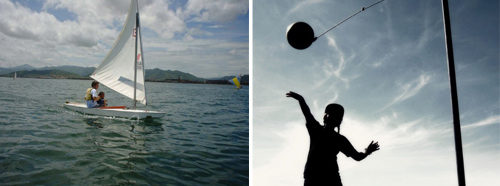
By the end of the week, I was tanned and rested, Michael was pale and suffering from a seven-day hangover and anxious to get back to work and his kids. He had run up a stupendous bar tab. One by one, I tore out all my American Express travelers’ checks, signed them, and handed them over to the hotel manager. “Do you have any money?” I asked Michael, who pulled out a few crumpled ones, which got us on the airport bus to the El and then back home to Burton Place, where Michael swore he would never leave the city again.
Winter eventually eased Chicago out of its icy grip, and spring and summer smiled on the new lovers. Michael and I were creating a sweet, cozy life together, tucked away in our Hobbit apartment. We were much richer in love than money and rarely went out, even for a cheap curry. I tried to make us romantic dinners in a kitchen that contained a sink, a small fridge, and a stove, but absolutely no counter space, drawers, or cabinets. I guess artists are not supposed to cook.
At night, Michael searched the Chicago TV stations for old black and white movies; he was a great fan of Frank Capra and cried every time he heard Jimmy Stewart say, “Zuzu’s petals.” We cuddled and kissed on the sofa, watching Mr. Deeds go to Washington or Sergeant York go to war or Lillian Gish and Robert Mitchum face off in The Night of the Hunter. My young dream of love, being half of a couple that needed nothing and no one but each other, had come true, except it was with a different Michael.
I was finally allowed to meet Michael’s kids who were both adorable moppets, even though the younger kid left the front door open and my little Yorkie Groucho ventured out into the Chicago night, never to return, and the older one took my bike out for an unauthorized spin, making it less than a block before a bigger kid shoved him off and stole it. All was forgiven. I was crazy about their father, whose “I love yous” and kisses soothed and tingled me at the same time.
In the midst of all this bliss, on a day I thought I looked especially cute in a Betsy Johnson pink-flowered minidress bought from a toothpick-chewing guy who sold designer clothes out of the trunk of his car, I flounced into the Oui offices to drop off my newest brilliant submissions and pick up a small check. The moment I walked in the door, I intuited something weird in the atmosphere, like the oxygen had been sucked out, or someone had set a small fire. Everyone in the office had a different odd expression, from grim death on the secretaries’ faces to editor Gerald Sussman’s ape-like grin as he bounced about on his tiny feet.
John beckoned me into his office. “We’re moving to Los Angles,” he said.
“Who? You? Oui?” I sounded like a deranged songbird. “What’s happening?”
“Everyone’s going. Well, the editors, art directors…” John rambled on, stacking up papers without looking at them, talking about how unhappy his wife was about leaving her friends and her family, how he’d have to buy a car, find a place to live. He worried if there were any fellow poets in L.A., that most unpoetic of cities, or just television studios and endless freeways.
Yes, yes. But what about me?

“I can still write for you though? We could mail stuff back and forth?” I tried to plant a look on my face that was both writerly and too cute to turn down.
John shook his head. “Not going to work. It would take too long, everything’s going to be crazy after the move…”
I handed him my hysterically funny short humor pieces, my best yet, and hoped that he would wait until I left to toss them in the bin. John found my check in a drawer and said, “I’m sorry.”
I autopiloted the walk home, my head full of mental arithmetic and plans: how much money was in my bank account, rent, electric, phone, what conventions were coming up, what photographers I hadn’t seen for a while.
Big events in my life never arrive by themselves, they insist on bringing along a friend.
My news — no more writing assignments, no more Oui modeling jobs, and we can say goodbye to our pal and neighbor, George, who was headed for L.A. with the rest of Oui’s art department — went unheard by Michael, who was waving a letter in my face.
“Esquire! Esquire magazine! They want me to illustrate Harry Crews’ column!”
Crews was a southern humorist who wrote about moonshine, coonhounds, hunting for squirrels, and bass fishing; his column in Esquire was called “Grits.”
Michael was a Chicago Jew who hated the outdoors, was afraid of trees, and had never seen a grit. Somehow an art director had decided these two would be perfect together. Michael was holding a contract from Esquire for a year’s worth of illustrations.
For Michael, this recognition from New York, from a magazine famous for its art and design, was the celestial sign he had been waiting for all his life, the confirmation he was following in the footsteps of his idols, Norman Rockwell and J.C. Leyendecker.
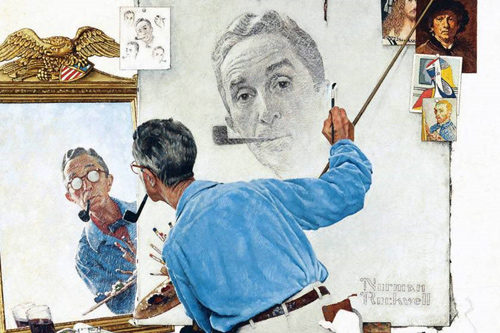
I was so happy for Michael that I could put aside my disappointment at the early death of my own writing career. After his first burst of exhilaration, however, Michael turned moody; one day I caught him brooding over a drawing, pencil posed unmoving over the paper, sad songs from Derek and the Dominos filling the apartment.
“C’mon,” I said as I kissed and stroked his balding head. “Let’s go out! Indian food. My treat.” I got a mumbled “Okay,” and Michael flipped the record over and went back to not drawing.
It was not the romantic, celebratory dinner I had imagined. The curry house was our special place, where I had first realized that I had fallen in love with this funny looking guy who made me laugh and claimed to adore me. He didn’t look so adoring now, as he shoved his vindaloo around his plate with a piece of naan and called the waiter over for his fourth Kingfisher beer. My attempts at happy conversation fell flat. I ate, and Michael drank in silence until he announced, “I’m moving to New York.”
Why was everything and everyone leaving for the coasts, after Chicago had finally generously bestowed on me a boyfriend, a semi-steady income, and a love nest apartment that was like living in a work of art?
“And me?” was my first and only thought. “Am I going with?” I asked.
Michael looked down and said, “I don’t know,” which was not the answer I had hoped for. My eyes prickled; I felt betrayed and angry and abandoned. In my mind I was shouting, “I didn’t want this! You wanted this! You told me you loved me!” but “I don’t understand,” was all I could say.
Michael did not understand either. We spent miserable hours that night plumbing his swirling thoughts and emotions: He loved me, felt desperately guilty about leaving his kids; he was worried about earning enough to pay child support and live on; he was moving to an unseen studio apartment sublet from a friend of a friend; and back, always returning to “I love you Gay, it’s just…”
The bottom line was he had to move to New York. That was all he knew and all he could deal with at the moment. We did not talk about my own crushed and battered feelings. And I was too self-centered and selfish to understand how leaving his adored children to follow his art was tearing Michael apart; his separation from his sons would be a wound he never recovered from. How could he leave his kids in Chicago and take his Playboy model girlfriend with him to New York?
In between our unhappy discussions of his tortured psyche, Michael packed up his apartment and said goodbye to his kids, weeping harder than they did and promising to fly them to New York as often as possible. I wandered up and downstairs, trying to stay out of the way of this family disunion. I picked at the few possessions I had kept with me over all the moves of the past three years and wondered what to do next. It would break my heart even more to live with just the memory of Michael in that magical Burton Place apartment, even if I could have afforded it on my own.
Suddenly I didn’t want to be in Chicago at all. I didn’t want to drag my portfolio around town in the freezing, blustering winter and the soupy, sticky, summer, or fight off handsy photographers, or murder my feet standing for hours on the cement floor of the convention center passing out brochures for power tools.
I called my old friend Mindy in Minneapolis, gave her my abridged story, and asked if I could stay with her for a few weeks.
I had last seen Mindy on her one and only visit to Chicago when I was still living with James, whom she took a deep dislike to after he offered her a Quaalude while I was in the shower and hinted that a threesome would be fun. Since then we kept touch through sporadic phone calls and lines scribbled inside funny greeting cards.
My friends are all generous spirits. Even though we had not spoken for months and months, Mindy said yes, come on up, she had room for me.
Michael and I said our goodbyes amid floods of tears. “What the hell am I doing?” Michael wept. I wondered that too. I gave him Mindy’s phone number and address and we parted, Michael off to conquer the illustration world in New York, me to do who the hell knew what in Minneapolis.
The 10 Biggest Underdogs to Win a Championship
There are a few cases in sports history where teams or individuals have walked into high pressure games as heavy underdogs, but they manage to walk out as champions. Here are ten underdogs who beat the odds and became legends.
- Holly Holm defeats Ronda Rousey (2015)

Undefeated UFC women’s bantamweight champion Ronda Rousey walked into UFC 193 a heavy favorite. In the preceding three years, Rousey easily made her way through the women’s division. Very few UFC experts or pundits gave her opponent Holly Holm a fighting chance.
Holm said she knew that Rousey was going to start the fight with a lot of aggression. In a post-game press conference she said, “I expected her to be aggressive and impose her will on me.” For Holm, the key to winning the fight was avoiding Rousey’s devastating armbar.
Early in the second round, Holm was able to land a well-placed kick to Rousey’s head. As Rousey fell to the mat, Holm began to circle the octagon with an expression of pure joy on her face. She knew she had just proven the experts wrong.
- Alexander Rossi wins the 100th Indianapolis 500 (2016)

In what was already a high-pressure day for IndyCar drivers, the 100th running of the “Greatest Spectacle in Racing” only added to their stress. In a field crowded with legendary Indianapolis 500 drivers, such as Helio Castroneves, Juan Pablo Montoya, and Tony Kanaan, Alexander Rossi was not high on the list of potential winners. When betting opened for the race, he was given 100–1 odds to win.
Thanks to a smart decision to not come in for more fuel with ten laps to go, Rossi managed to outlast his competition in a race that saw almost a quarter of the field unable to finish. The Indianapolis 500 is often a race of attrition. It’s not always the fastest car or the best driver who wins. On this day, Rossi and his team had a lot of luck on their side.
With his win, Rossi became the first rookie in 15 years to win the Indianapolis 500.
- Houston Rockets win the NBA Championship (1995)
Even though they won the NBA championship in 1994, no one expected the Houston Rockets to repeat the next year. Michael Jordan and his Chicago Bulls were the dominant force in the NBA, winning three out of the last four NBA Championships. Now that Jordan was retired (temporarily), other teams in the league saw a major opportunity to win the NBA Finals.
The biggest challenge facing the Rockets was the makeup of their roster. Aside from future basketball Hall of Famer Hakeem Olajuwon, the Rockets were comprised mostly of average level talent.
The Rockets entered the 1995 NBA playoffs as the No. 6 seed in the Western Conference. They went on to beat the top-seeded San Antonio Spurs in the conference finals, and then they swept the No. 1 seed Orlando Magic in the NBA finals.
- New York Jets Win Super Bowl III (1969)
In the first professional football championship game that was officially called the “Super Bowl,” the New York Jets entered the game as an 18-point underdog. With a betting line that had them losing by more than two touchdowns, few were expecting the Joe Namath-led Jets to put up much of a fight against Johnny Unitas and the Baltimore Colts.
Namath entered the game having thrown more season interceptions (17) than touchdowns (15). It also did not help that Namath had a well-known “playboy” reputation. His late night parties with celebrities were often the talk of the town.
Despite a Jets roster that was seen as mostly inferior to the Baltimore Colts, Namath decided to walk into the Miami Touchdown Club and make a bold prediction: “We’re gonna win the game. I guarantee it.” This declaration just days before the big game may have been the spark that led the Jets to beat the Colts 16-7.
- New York Mets Win World Series (1969)

At the start of the 1969 season, the New York Mets were given 100-1 odds to win the National League pennant. The previous year, the Mets finished in ninth place. Many fans still could not fathom the thought of the Mets putting up any kind of a fight in the National League. Little did those fans realize, the Mets had an influx of young talent and future Hall of Famers.
The 1969 Mets had one of the best pitching lineups of the season, including Nolan Ryan and Tom Seaver. Buoyed by solid hitting from Tommie Agee and Cleon Jones, the Mets would go on to win the NL East with an eight-game margin. But as they entered the World Series, the odds were still stacked against them.
The Mets would have to travel to Baltimore to face the odds-on-favorite Orioles in the World Series. To the shock of many, the Mets went on to win the World Series in only five games. The improbable season led to the team earning the nickname “The Amazing Mets.”
- New York Giants Win Super Bowl XLII (2008)
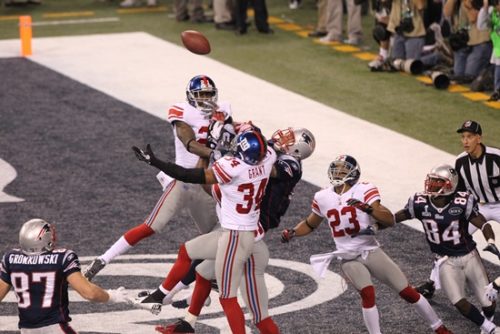
How do you defeat an undefeated team? This was the question the New York Giants had to answer when facing the New England Patriots in Super Bowl XLII. For many football fans, it seemed the destiny of Tom Brady, Bill Belichick, and their New England Patriots to finish the 2008 season with a perfect record.
While the Patriots were trying to become the first undefeated team since the 1972 Miami Dolphins, the New York Giants had a very different route to the championship game. With a 12-4 regular season record, and having not won a playoff game in seven years, the Giants entered the Super Bowl as 12-point underdogs.
New York Giants quarterback Eli Manning threw for two key touchdowns in the fourth quarter and finished the game with 255 passing yards. The real highlight of the game came with just over one minute left in the fourth quarter. The Giants needed to score a touchdown to take the lead. Manning dropped back for a pass as New England Patriots defenders pulled at his jersey, trying to wrestle him to the ground. Manning managed to escape and lobbed a 32-yard pass to receiver David Tyree, who caught the ball by wedging it between his right hand and his helmet. The “Helmet Catch” is considered one of the greatest plays in Super Bowl history. It only added to the legend of a game that saw the New York Giants go on to defeat the “undefeated” New England Patriots 17-14.
- Villanova Wins the NCAA Men’s Basketball Championship (1984)
The 1984 Georgetown Hoyas men’s basketball team included legendary coach John Thompson Jr., future basketball Hall of Famer Patrick Ewing, and a strong supporting cast of players. On the other side of the court stood the polar opposite of the Georgetown Hoyas.
Heading into the 1984 NCAA Men’s Basketball Tournament, the Villanova Wildcats had a mediocre 25-10 record. The team finished the regular season unranked and was fourth in Big East standings. Few expected the Wildcats to make it all the way to the NCAA championship game.
If Villanova wanted to beat Georgetown for the championship, they had to play a perfect game; and that is exactly what they did. That night, Villanova shot an incredible 79 percent from the floor, a percentage that has yet to be matched in a championship game.
- Chicago White Sox Win the World Series (1906)

The Chicago Cubs spent the 1906 MLB season racking up the most regular-season wins in baseball history (116), coasting to the National League pennant. Their cross-town rivals, the Chicago White Sox, spent most of that season earning the nickname “The Hitless Wonders.” The White Sox amassed the worst batting average in the American League (.230), and 23 fewer wins than the Chicago Cubs.
As both teams began the 1906 World Series, it was all but settled that the Cubs would easily rout the White Sox and win the World Series. The White Sox had different plans and managed to beat the Cubs in six games. It was a historic World Series upset. The victory was even more surprising because the “Hitless Wonders” managed to have an even worse batting average in the World Series (.198).
- Donerail Wins Kentucky Derby (1913)

The Kentucky Derby is known as the “fastest two minutes in sports.” Each year, thousands of people wager on the fastest horses in America. One of the most exciting things about the Kentucky Derby is the ability to win big on a long-shot bet.
In 1913, some very lucky people won big by betting on the 91-1 underdog horse, Donerail. Leading up to the race, Donerail was an unknown commodity who had no high profile victories on his record. After leading Donerail to victory, the jockey, Roscoe Goose, earned the nickname “Golden Goose.”
Just a $2 bet on the underdog horse would have netted you $184.90. To this day, the victory stands as the biggest upset in Kentucky Derby history.
- Buster Douglas Beats Mike Tyson (1990)
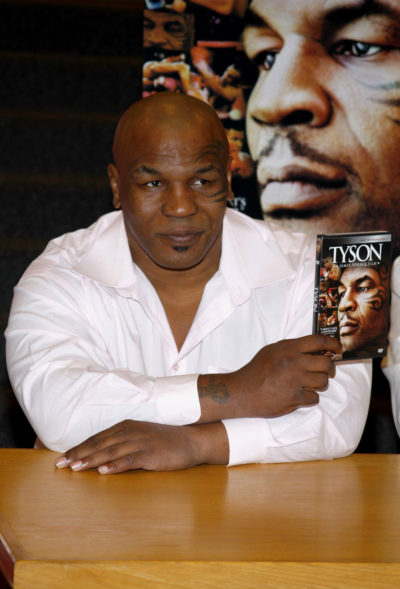
Many sports fans remember where they were in 1990 when underdog Buster Douglas knocked out Mike Tyson. It was a moment in sports that is frozen in time, and it is remembered by many as the most stunning upset in sports history.
The historic fight took place in the Tokyo Dome in Japan. Mike Tyson entered the fight undefeated (39-0) and was the WBC undisputed heavyweight champion. His opponent, James “Buster” Douglas, was considered just another contender that Tyson would easily vanquish. Douglas entered the fight with four losses and one draw.
In the ninth round, both Douglas and Tyson were tired and growing weaker by the second. Douglas suddenly landed a powerful right uppercut and a series of jabs to the head of Tyson. It was over. Tyson tried in vain to answer the official’s ten count, but Douglas’ final barrage was too much. Buster Douglas walked into the Tokyo Dome a 42-1 underdog, and he walked out a champion.
The Art of the Post: The One Thing Alice Provensen Couldn’t Share With Her Husband
Read all of art critic David Apatoff’s columns here.
The great illustrator Alice Provensen died last month at the age of 99. She was famous for the many popular books for children that she wrote and drew with her husband, Martin.
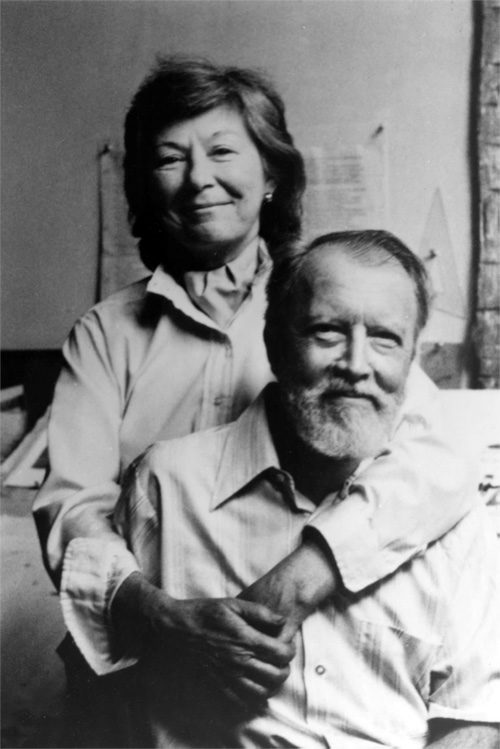
Alice and Martin met during World War II. They fell in love and formed an award-winning team that collaborated closely for the next 40 years. Generations of children have now grown up on their books.
They started by illustrating books written by other authors, such as The Color Kittens and The Fuzzy Duckling, classics from the Little Golden Book series.
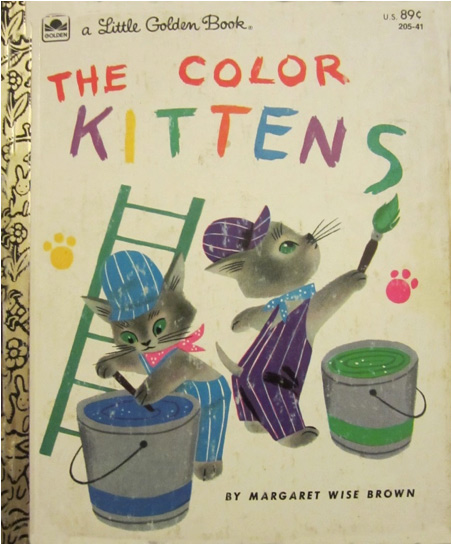
Soon the Provensens were writing and illustrating their own books. Some were based on classic stories such as Aesop’s Fables, Mother Goose, Bible tales, and the plays of Shakespeare. They won the Caldecott Medal in 1983 for their book, The Glorious Flight, about the first flight over the English Channel. Their beautifully designed books, The Iliad and The Odyssey and The Golden Treasury of Myths and Legends stand out as classics of children’s book illustration.
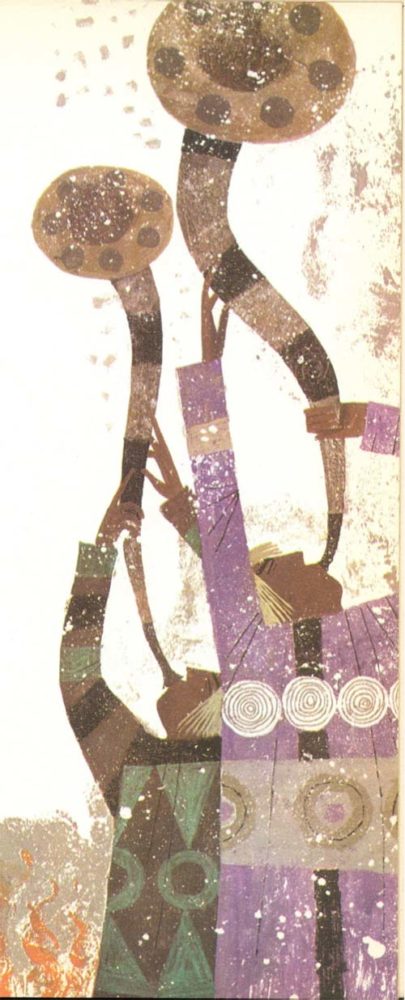
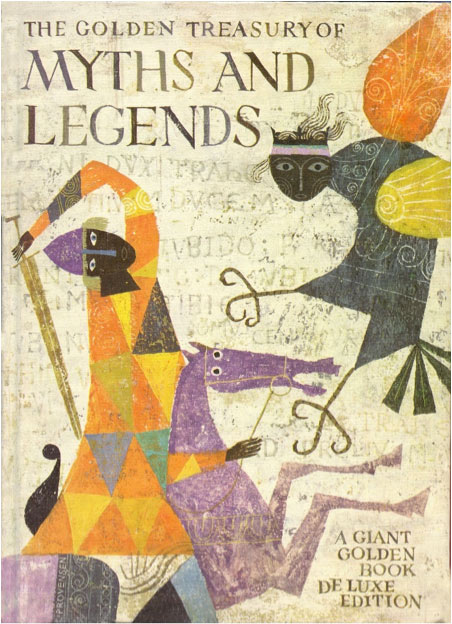
As children’s book historian Leonard S. Marcus told The Washington Post when Alice passed away, “Some of their books sold millions of copies. There was a kind of lightness and open space in their work. You could project your own imagination into their world.” They found a secret for success that few children’s book illustrators and authors could equal.
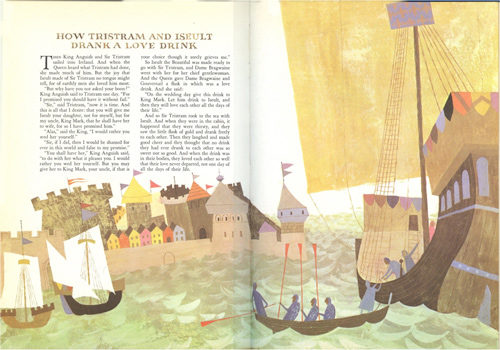
It’s hard to imagine how a creative team could have been any closer than the Provensens. The two came from almost identical backgrounds. They were both born in Chicago and both moved to California when they were twelve. They both attended the University of California, and both received scholarships to train at the Art Institute of Chicago. They both went to work for Hollywood studios (Martin at Disney and Alice at Walter Lantz). They were married in 1944, then moved to Washington where they both worked supporting the war effort.
In 1950 the Provensens purchased an abandoned farm in upstate New York, far from city life. They moved two drawing tables into the barn and started working together, back to back. Their excellent book, A Year at Maple Hill Farm, describes their sweet life on the farm.
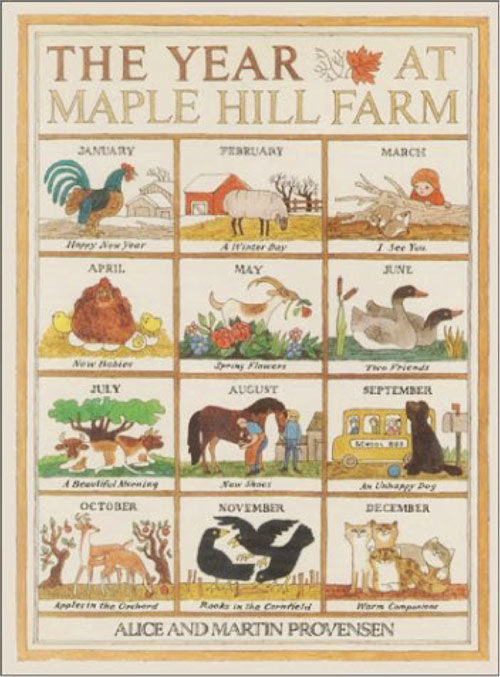
Their styles blended together so perfectly that for nearly 40 years no one could distinguish who did the words and who did the pictures. Ms. Provensen recalled for the Orange County Register in 2009, “Sometimes we’d work on the same page. I’d see something, or tell him how to fix something.” In response to questions from Publishers Weekly about the secret of their working methods, Alice simply said, “we were a true collaboration. Martin and I really were one artist.” No one ever saw their works in process.
Living and working together in one room there was very little space for privacy or egos. The two seemed to share everything, completing each other’s thoughts and brush strokes.
Yet, there was one small part of their work that the Provensens chose to keep private from each other. When they were just beginning to come up with an idea, they would sometimes tie a string across the room and hang a sheet or blanket between their two tables. As Alice recalled in her interview with Publishers Weekly, “Once in a while one of us may have had an idea we were just developing that we didn’t want the other person to see just yet…. We would string a curtain up between our desks.”
Even though this barrier was purely symbolic — a flimsy drape that could easily be breached at any time — it still had psychological importance.
In those first sparks of the creative process, when an artist tries to coax an idea into existence, the idea can be so fragile that other words or voices — or even a second set of eyes — might scare it off. Explaining it prematurely to your partner using an existing vocabulary could rob the idea of its creative potential.
Married people can share all kinds of things and never blush once. But the nakedness of a new idea — that can be a little too personal, and sometimes needs to be kept concealed.
Martin passed away in 1987. Now Alice and Martin are back together on the same side of the curtain.
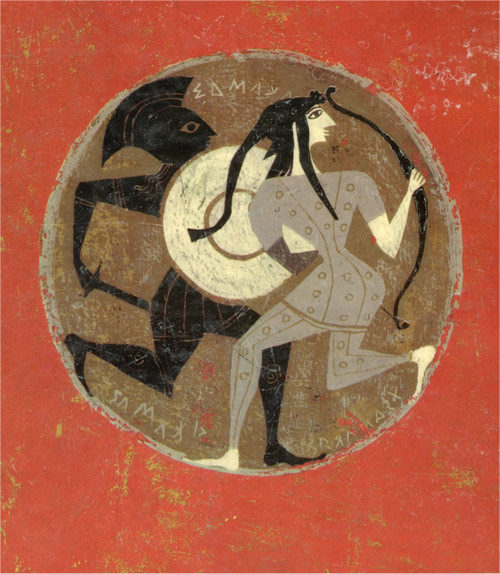
News of the Week: Saving Bookstores, Star Wars, and Some Guy Ate 30,000 Big Macs
Barnes & Noble
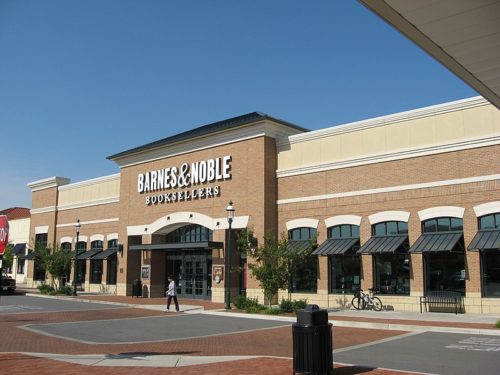
I’ve mentioned here before that if You’ve Got Mail were made today, The Shop Around the Corner would team up with the Fox Books superstore and go up against Amazon (I smell sequel!).
I thought of that after reading this New York Times op-ed by David Leonhardt on how we need to save Barnes & Noble. It seems like only yesterday when B&N (and other big chain bookstores) were seen as the bad guy. Now, with Amazon taking over everything, and the major chains going away, we’re getting nostalgic for the big chains. And well we should be. I want brick-and-mortar stores to survive, even if I love Amazon at the same time. (It’s interesting how the number of indie bookstores is increasing in this age of online book sales.)
The only problem I have with Leonhardt’s piece is a paragraph near the end, where he mentions that “publishers are focusing on big name writers” and “the number of professional authors has declined.” Publishers have always put their money and energies behind the bigger name authors, and I think there are probably more writers right now than ever; they’re just doing more on their own.
Now, a Story about a Family That Wants to Rule the Galaxy
Solo, the new Star Wars movie directed by Ron Howard, comes out on May 25. It was announced this week that the fifth season of Arrested Development launches on Netflix on May 29. Since Howard is the narrator of Arrested Development, it makes sense that there would be a way to combine the two. And here it is.
In other Star Wars news, a set of twins born on May 4 (aka “Star Wars Day”) was given the names of characters from the series to celebrate the day they were born. They were named Jabba the Hutt and Chewbacca (just kidding — they were given the middle names Luke and Leia).
Come, Let’s Mix Where Rockefellers Walk with Sticks
How much would you pay for an original Matisse? How about $80 million? That’s just one of the sales in this week’s auction of the David and Peggy Rockefeller art collection at Christie’s in New York City.
The three-day auction wasn’t even finished yet when they broke the record for the most money brought in from an art collection. On the first day, the total was at $650 million.
A lot of the winners were anonymous bidders. I can promise you I wasn’t one of them, though I did once own an album that had Edward Hopper’s Nighthawks on the cover.
And the No. 1 Rock Artist of All Time Is …
You wouldn’t think that someone would take the time to rank all 214 members of the Rock and Roll Hall of Fame from best to worst, but you’d be wrong. Bill Wyman did it for Vulture.
It’s a massive undertaking, so kudos to Wyman for even attempting it. He even gives his list of the artists that aren’t in the HoF but should be. Now, all lists are subjective, but this one is especially so, and I’m sure it will lead to a lot of arguments. Wyman says a lot of things about certain artists that fans of those artists are going to hate, and in some cases, his arguments are inconsistent. I mean, picking Chuck Berry over the Beatles? The Ramones over Buddy Holly? Jeff Beck and Hall & Oates should be higher on the list, and I know Bon Jovi fans aren’t going to be happy at all (though I think they should be number 215 in this list of 214). Let me know in the comments below what you think of the list.
You Want Fries with That?
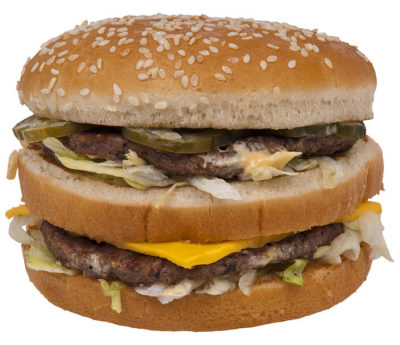
I once stopped at a Burger King and was informed that I couldn’t have a cheeseburger because they were all out of buns. I was rather stunned. A burger place that runs out of buns? That’s like Dunkin’ Donuts running out of coffee.
Don Gorske broke a record recently for eating burgers, not at Burger King, but at McDonald’s. He finished his 30,000th Big Mac last Friday at the same Fond du Lac, Wisconsin, location where he ate his first one in 1972. I guess this answers the eternal question, “How many years does it take to eat 30,000 Big Macs?”
With all of the publicity that Gorske’s eating has garnered, McDonald’s should give him free meals for life.
And if you’re wondering what it has done to him, note that Gorske has run marathons and probably has better cholesterol than you or I.
IMHO, This Controversy Is Ridiculous
I had no idea there was a debate going on about what that the abbreviation IMHO stands for. Many people think it stands for “In My Honest Opinion.” It actually stands for “In My Humble Opinion,” as this piece from The Atlantic explains.
BuzzFeed is conducting a poll to find out what readers think is right, and like most of the things that BuzzFeed does, the results are wrong. As I type these words, “In My Honest Opinion” has 57 percent of the vote, and “In My Humble Opinion” has 43 percent. Either BuzzFeed readers don’t know what they’re talking about, or they’re just clicking the wrong choice on purpose to mess with the results. The latter would be funny, but I sense it’s the former.
For the record, “LOL” stands for “laugh out loud,” “BRB” is “be right back,” and “tl;dr” stands for “this article is too long so I didn’t read it but I have an opinion on it anyway.”
RIP Art Paul, George Deukmejian, Anne V. Coates, Dick Williams, and Gayle Shepherd
Art Paul was the first art director for Playboy and created the famous bunny logo. He died last Saturday at the age of 93.
George Deukmejian was the governor of California for two terms, from 1983 to 1991. He died Tuesday at the age of 89.
Anne V. Coates edited many classic movies, including Lawrence of Arabia, The Elephant Man, Murder on the Orient Express, and Out of Sight. She received several Oscar nominations and was given an honorary award in 2016. She died Tuesday at the age of 92.
Dick Williams was a singer in the Williams Brothers singing quartet, which included his brothers Bob, Don, and Andy, who later went on to solo success. He died Saturday at the age of 91.
Gayle Shepherd was a member of another famous sibling group, the Shepherd Sisters, best known for their hit song “Alone (Why Must I Be Alone).” She died Monday at the age of 81.
Quote of the Week
“Movie reviews, they’re not even movie reviews anymore, they’re just ‘how come you made the movie you made and not the one I would have made?’”
—Bill Maher, ranting about how everyone seems to get so easily offended these days (warning, some salty language!)
This Week in History
Alan Shepard Becomes First American in Space (May 5, 1961)
Shepard went into space aboard the Mercury spacecraft Freedom. He made a second trip into space in 1971 as part of Apollo 14, along with astronauts Stuart Roosa and Edgar Mitchell.
Three Stooges Debut (May 5, 1934)
The very first Three Stooges short was titled Woman Haters, and the entire thing is done in rhyme and song. It’s one of the few Stooge shorts where they don’t use the names Moe, Larry, and Curly. Their names here are Tom, Jim, and Jackie.
Look for Walter Brennan as a train conductor. Co-star Marjorie White, who plays Larry’s bride, was killed in an auto accident just a year after Woman Haters was released.
This Week in Saturday Evening Post History: Father’s Homework (May 7, 1960)
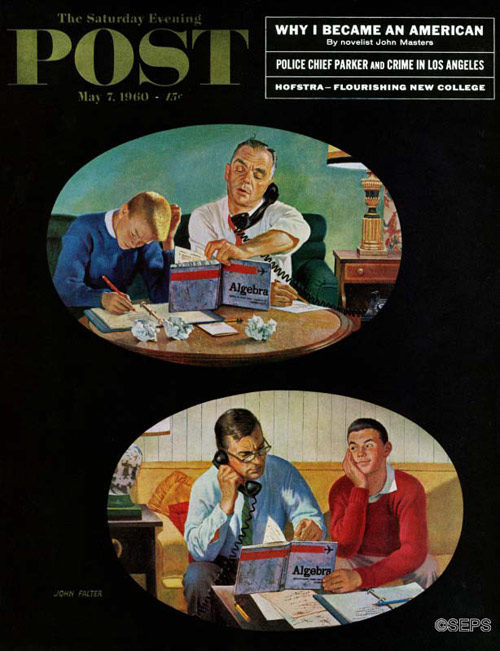
John Falter
May 7, 1960
Have you ever had that dream where you’re back in school and you have a big test, and if you don’t pass it you won’t graduate? I haven’t had a dream like that in many years, but I did have it throughout my 20s and 30s, and it disturbed me each time. During the dream, I could actually feel the dread of being stuck back in school. I’d wake up relieved that I wasn’t actually back in school but worried about going back to sleep, because I didn’t want the dream to continue. I guess I assumed my “waking up” was like a commercial break in the story.
Anyway, here’s a cover by John Falter depicting two dads trying to help their sons with algebra homework. I had to repeat algebra.
How to Make a Big Mac at Home
Did you know that there are several websites and books dedicated to the art of replicating restaurant food at home? One of the most famous is Top Secret Recipes. Here’s their attempt at copying the recipe for a McDonald’s Big Mac. Besides ground beef and a seeded bun, you’ll need dill pickles, iceberg lettuce, and their copycat recipe for the Big Mac special sauce.
And after you eat it, just think: only 29,999 more to go!
Next Week’s Holidays and Events
Mother’s Day (May 13)
Here’s a Post article on Anna Jarvis, known as “the woman behind Mother’s Day.” Make sure you get something nice for your mom this Sunday. And by “nice,” I don’t mean something you find at the last minute at the CVS checkout counter.
But when you do buy her something, remember: Mother’s no mechanic!
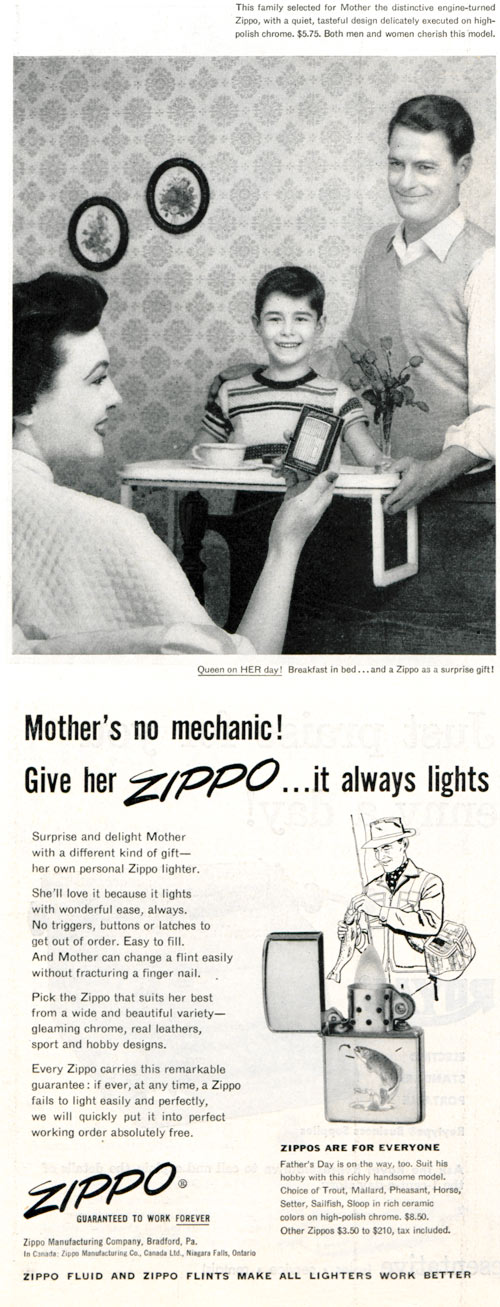
Considering History: The Great Gatsby, Multicultural New York, and America in 1925
This series by American studies professor Ben Railton explores the connections between America’s past and present.
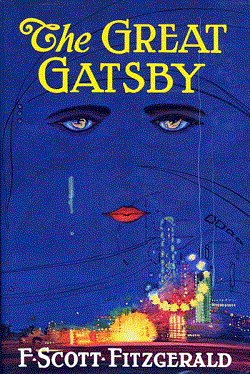
On April 10th, 1925, the first edition of F. Scott Fitzgerald’s novel The Great Gatsby was released in the United States. Originally published to mixed critical reviews and mid-level sales at best, over time Gatsby has become one of the most acclaimed and well-read American novels. It is often located close to the top of “Best of the 20th Century” lists, is a perennial contender for the elusive title of The Great American Novel, and is one of the most frequently taught texts in American classrooms. While Fitzgerald did not choose to go with the alternate title Under the Red, White, and Blue, there’s no question that his book has become closely linked to images of American identity and community—and to national narratives such as the American Dream.
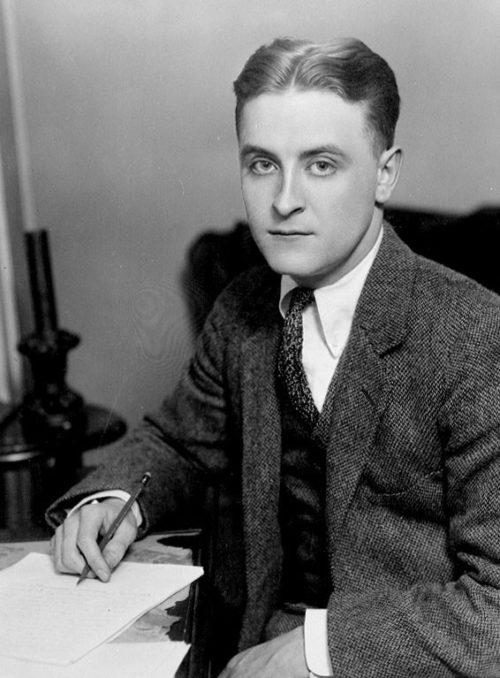
Fitzgerald’s novel is also closely connected with its time period and cultural moment, and specifically with images of the “Roaring Twenties.” The novel’s depictions of wealth, excess, recklessness, the interconnected cultures of alcohol and organized crime during Prohibition, and new technologies like automobiles and Hollywood silent films, have become synonymous with that era between World War I and the Great Depression. Yet while Gatsby certainly captures those historical and cultural contexts, there are many other sides to 1925 America that are much less central to its world. There are other books published in 1925 that can better connect us to those histories and add them into our collective memories of the era.
Perhaps the most striking historical absence from Fitzgerald’s novel is that of African Americans and the nascent Harlem Renaissance. As part of the first wave of what came to be known as the Great Migration, large numbers of African Americans had been migrating to New York City for more than a quarter-century, and the upper Manhattan neighborhood of Harlem was by 1925 one of the nation’s most vibrant African American communities. Many of New York’s white socialites were frequent visitors to and patrons of the jazz clubs, parties, and social events that came to embody the relationship between that Harlem world and the city around it. Yet despite its New York setting, Fitzgerald’s novel does not reference Harlem at all — indeed, the book’s only African American characters are a stereotypical trio of “three modish negroes, two bucks and a girl,” whom the narrator Nick Carraway observes in a passing car, “the yolks of their eyeballs roll[ing] toward us in haughty rivalry.”

Providing an important corrective to that absence is another ground-breaking 1925 book, The New Negro: Voices of the Harlem Renaissance. Assembled and edited by the philosopher, educator, and activist Alain Locke, The New Negro features a broad and varied collection of African American creative writers, scholars, historians, journalists, and visual artists, highlighting the wide range of forms, topics, and contexts to which this developing Harlem community had already connected. From the first published story by Zora Neale Hurston (who was about to enter Barnard College) to some of the earliest published poems by Langston Hughes, along with contributions from established authors and leaders such as James Weldon Johnson and W.E.B. Du Bois, The New Negro reflects a burgeoning African American, New York, and national community that existed alongside Gatsby’s world but offers a very different side to America in 1925.
In the political realm, many of the most prominent and divisive 1925 debates focused on the interconnected topics of immigration and national identity. Coming at the culmination of a four-decade period of particularly significant waves of immigration, the 1921 Emergency Quota Act and 1924 Quota Act had enshrined exclusionary, white supremacist attitudes in national immigration law. As South Carolina Senator Ellison DuRant Smith put it in a Senate speech in support of the 1924 law, “It seems to me the point as to this measure … is that the time has arrived when we should shut the door. … Thank God we have in America perhaps the largest percentage of any country in the world of the pure, unadulterated Anglo-Saxon stock … and it is for the preservation of that splendid stock that has characterized us that I would make this not an asylum for the oppressed of all countries.” Debates over these laws and policies, and whether for example to extend them to immigrants from Mexico and other Western Hemisphere nations (initially not included in the 1924 Act), continued throughout the remainder of the decade.
Fitzgerald’s novel does include such a white supremacist and xenophobic voice in the character of Tom Buchanan, and particularly his unhinged Chapter 1 rant about how “civilization’s going to pieces” and “if we don’t look out the white race will be—will be utterly submerged.” Tom is as close as the novel has to a villain, and by linking him to these bigoted views Fitzgerald certainly makes a clear point about those national debates. But although New York City was one of the most consistent destinations for the era’s immigrant arrivals (and had been since the late 19th century), Gatsby does not feature any overtly immigrant or even particularly ethnic American characters. Indeed, its only such minor character is Meyer Wolfsheim, the “small, flat-nosed Jew” to whose illicit and criminal activities Jay Gatsby is connected in unclear but unsavory ways and who is at best a stereotypical character of Jewish and Jewish American identity.
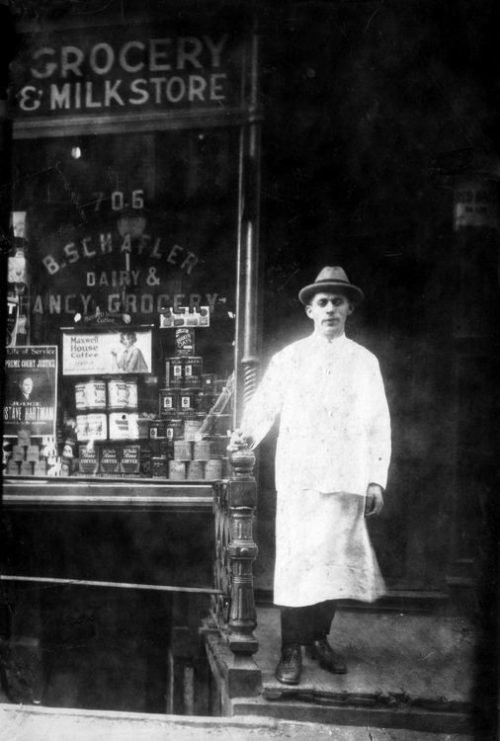
To read about the very distinct images of Jewish immigrants to New York City and Jewish American identities, read Anzia Yezierska’s Bread Givers. This compelling and ground-breaking 1925 novel offers is narrated by Sara Smolinksy, the daughter of Polish Jewish immigrants whose perspective and story we follow from age 10 through her graduation from college and subsequent professional and personal developments. Through Sara’s eyes we see the challenges facing a multi-generational Jewish American immigrant family (with a father determined to maintain his role and identity as an Orthodox Talmud scholar), the communal setting of the Lower East Side’s tenements, and the possibilities and limitations of assimilation into American society for a second-generation immigrant such as Sara.
On the anniversary of Gatsby’s publication, adding books like Bread Givers and The New Negro to our reading list can only help contextualize and expand the world and meanings of Fitzgerald’s classic novel.
News of the Week: Phones Take Over, Satellites Are Falling, and Weird Al Did Something Cheesy
Brain Drain
I know I’ve talked about smartphones before, how everyone is addicted to them and how they’ve changed everything (mostly for the worse), but indulge me a few more words on the subject. (If you’re already bored, you can scroll down the page a bit and read about Jake Tapper’s new novel and Marilyn Monroe’s new movie.)
To put it simply, being connected all the time isn’t a good thing. Sure, smartphones are great in emergencies, but there’s no mental breathing room anymore. Before smartphones, we would put down our phones and mail, shut off our TVs, stereos, and the internet, and leave the house. Now we carry those things around with us 24/7. We’re always “on,” and it has changed the way we associate with each other and with tech, and has even affected the way that we think. It can’t be good to have this much information coming at us all the time. That’s why I’m in favor of dumb phones — phones that are actually phones and not also connected to the web — instead of smart ones. I’d also suggest signing up for a cheap phone plan if you don’t have to be connected to the web all the time and just want to make and receive calls. And don’t ever give up your landline!
CBS Sunday Morning’s Ted Koppel had a piece on information overload this week, detailing how smartphones, the web, and social media have taken charge of our lives. He even interviewed the guy who invented the Facebook “like”:
On a related note, Tuesday marked the 45th anniversary of the first cellphone call.
Down to Earth
In January, I told you about a Chinese satellite that was going to crash back to Earth. This week, that satellite did indeed come back, and luckily no one was hit by it, though you’d have had better luck hitting the Powerball.
Most of the Tiangong-1 satellite burned up during reentry, and what was left seems to have fallen into the Pacific Ocean. Those of you who had “2500 miles south of Hawaii” in your office pool are the big winners.
2001 at 50
Speaking of things in space: This little admission may destroy any pop culture cred I have and may even get me barred from several theaters, but I’m not a fan of Stanley Kubrick’s 2001: A Space Odyssey. It’s true that I’ve only seen it once, many years ago, but I remember being profoundly disappointed in it, even if I appreciate its influence. Maybe I’ll watch it again to celebrate the film’s 50th anniversary and see if I agree that the film is not only fascinating, but one of the best movies of all time.
New Books
In addition to the new books you’ll find in the current issue of the Post, here are four more that will be released soon.
Look Alive Out There: Essays by Sloane Crosley. Crosley first broke through with her fun essay collection I Was Told There’d Be Cake, and this new one is getting great reviews too. (Out now)
The Hellfire Club by Jake Tapper. The CNN anchor’s first novel is a political thriller set in 1950s Washington, D.C. Here’s an excerpt. (April 24)
The Ideal of Culture: Essays by Joseph Epstein. Epstein is one of our great essayists, and his new collection explores such topics as parenthood, cowardice, grammar, the 1960s, F. Scott Fitzgerald, and reaching the age of 80. (May 7)
Ten Arguments for Deleting Your Social Media Accounts Right Now by Jaron Lanier. As you can read above, this is a subject that’s near and dear to me, so I can’t wait to read what the tech/virtual reality visionary has to say about Facebook and Twitter. (May 29)
Digital Marilyn
It’s obvious that Marilyn Monroe will never really die. Not only does she still make a lot of money decades after her death, but now she’s coming back to the movies.
Actress Suzie Kennedy will portray Monroe in a new film about the actress’s life. She already looks a lot like Monroe, but she’s going to have help from digital technology. A team of tech whizzes took 3,000 photos of Kennedy’s face and body to create an “avatar” of Monroe that will be featured in the film.
This could be an incredible advance in filmmaking. At some point you know we’re going to see new movies and TV shows starring Abbott and Costello, Cary Grant, and Humphrey Bogart. We’ve already seen commercials that use the technology, and digital trickery is used online all the time. But I bet one day we’re going to have entire movies based on the technology, and stars will never stop working. It’s one of those tech developments where you say, “Wow, this is so cool!” and then a few minutes later you say, “My God, where is this leading?”
Congrats
I’d like to take a moment here to say a few words about a couple of milestones at the Post. The first is the magazine itself, which was honored by the Pop Culture Association this week at their 48th conference. They describe us as “an American institution” with a “unique cultural legacy,” and I have to say I agree with that.
And happy anniversary to Executive Editor Patrick Perry, who celebrates 40 years at the magazine!
RIP Steven Bochco, Winnie Mandela, Rusty Staub, Anita Shreve, and Deborah Carrington
Steven Bochco was the legendary TV producer and writer responsible for such shows as Hill Street Blues, L.A. Law, NYPD Blue, Murder One, and Doogie Howser, M.D. He also wrote the iconic sci-fi movie Silent Running and several classic episodes of Columbo. He died Sunday at the age of 74.
Several friends and stars offered their condolences and memories of Bochco in The Hollywood Reporter, including Sharon Lawrence, Jill Eikenberry, and Mike Post.
Winnie Madikizela-Mandela was an anti-apartheid activist and the ex-wife of Nelson Mandela. She died Monday at the age of 81.
Daniel “Rusty” Staub helped the New York Mets win the National League pennant in 1973. He also played for the Detroit Tigers, Texas Rangers, Houston Astros, and Montreal Expos. Staub died last Thursday at the age of 73.
Anita Shreve was a beloved author of such novels as The Pilot’s Wife, The Weight of Water, and Sea Glass. She died last Thursday at the age of 71.
Debbie Lee Carrington was an actress and stuntwoman best known for her appearance in the Arnold Schwarzenegger film Total Recall and her role as the woman Mickey wants to date on Seinfeld. She also appeared on The Drew Carey Show. As a little person, she often doubled for children in movies, including Titanic and Child’s Play. She died in March at the age of 58.
Best and Worst of the Week
Best: Weird Al Yankovic, along with veteran crossword-maker Eric Berlin, took over The New York Times crossword puzzle on Wednesday with a cheese-themed puzzle. An example of the kind of clues you’ll find? 20-across is “Cheesy 1992 military drama.” The answer is A Few Gouda Men.
You have to subscribe to do the puzzle, but you can see what it looks like in this PDF.
Worst: I’ve been meaning to catch up on Instinct, the new police drama starring Alan Cumming. Looks a little routine — an unpredictable genius teams up with a by-the-book detective to solve crimes, how novel — but Cumming is always good, and it looks like fun. But this week’s episode, about an Amish boy who is murdered after he leaves home and moves to New York City, felt familiar to a lot fans. A little bit too familiar. Turns out the plot and scenes mirror a 2009 episode of another buddy-detective show, Bones, right down to some of the clues.
This Week in History
First Issue of TV Guide (April 3, 1953)
Who was on the cover of the first issue? It was a baby. Specifically, the newborn son of Lucille Ball and Desi Arnaz, Desi Arnaz Jr. Ball actually arranged ahead of time to have a caesarean section so the birth would coincide with the airing of the I Love Lucy episode where Ball’s character Lucy Ricardo gave birth as well.
Dr. Martin Luther King Jr. Assassinated (April 4, 1968)
Wednesday marked the 50th anniversary of the death of the civil rights leader. King wrote a piece for the Post in 1964 titled “Negroes Are Not Moving Too Fast,” and here’s an interview NBC’s Sander Vanocur did with King 11 months before his assassination:
This Week in The Country Gentleman History: Cousin Reginald is the Hero (April 6, 1918)
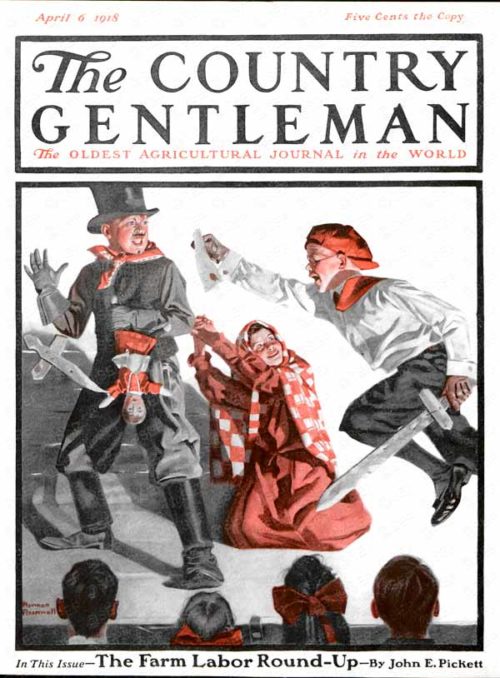
Norman Rockwell
April 6, 1918.
The Country Gentleman, a sister publication of the Post, was published from 1831 to 1955. Norman Rockwell painted several covers for it, including this one. When I first saw it, I couldn’t quite figure out what it was all about. I thought it might be titled “Crazed Fan Disrupts Performance of A Christmas Carol.” The cover is actually part of a series of paintings that Rockwell did for the magazine focusing on a group of boys and their cousin Reginald. That’s Reginald with the sword.
April Is National Grilled Cheese Month
I’m pretty much a traditionalist when it comes to grilled cheese — I prefer cheddar or American cheese on white bread — but there are so many other options if you want to try something a little different for National Grilled Cheese Month.
Here’s a recipe that Bon Appétit calls the “Best-Ever Grilled Cheese,” though it has mayonnaise, so I don’t know if it deserves that title. Here’s one called a Nacho Grilled Cheese, made with jalapeños and Doritos. This one from Genius Kitchen is made with green olives. And if you’re going to have grilled cheese, you can’t forget this.
Maybe you can do Weird Al’s cheese puzzle while eating grilled cheese, if that’s not too much cheese for you all at once.
Next Week’s Holidays and Events
Winston Churchill Day (April 9)
This day is mostly celebrated in the United States, marking the occasion in 1963 when President Kennedy named the British Prime Minister an honorary U.S. citizen. Here’s a 1939 Post piece about Churchill titled “Old Man in a Hurry,” and here’s our interview with John Lithgow, who plays Churchill in the Netflix series The Crown.
National Siblings Day (April 10)
I know, I know, sometimes you argue with your brothers and sisters (I’m the youngest of seven), but maybe today you can put that all aside. You can always argue tomorrow.
The Legacy of Oklahoma!, the First Broadway Musical Sensation
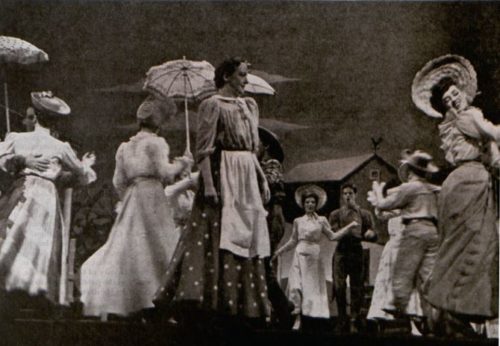
Theresa Helburn, of the prestigious Theatre Guild group, was seeking just $35,000 more to stage a musical version of Lynn Riggs’s Green Grow the Lilacs in 1942, but it was difficult to convince investors to fund the project. More than 50 people turned her down, possibly because of the group’s failed production of the straight play in 1931. Helburn and her partner Lawrence Langner drummed up the necessary support, however, and opened the musical Away We Go for previews in New Haven, Connecticut.
After some changes to Away We Go — songs were shuffled and unruly onstage pigeons were nixed — the musical in its final form, Oklahoma!, opened 75 years ago on Broadway. The naysayers of the New York theater crowd didn’t just underestimate the show’s potential; they passed up the opportunity to take part in the first Broadway musical smash hit.
Public interest in the show grew exponentially after its Broadway premiere, leading one radio announcer to quip, “Look at that play Oklahoma! A man died last week and left his place in line to his wife. If she dies before she gets her tickets, her place in line goes to an uncle in Baltimore.” Reportedly, the $4.80 tickets were going for as much as $50 on the street.
The folksy musical was the first collaboration between composer Richard Rodgers and lyricist Oscar Hammerstein II. It was also among the first ever musicals, as we typically know them today. Oklahoma! told an ambitious story coherently using lyrics, dance, dialogue, and music — a form considered a “book musical.”
Rodgers and Hammerstein would go on to rule Broadway in the postwar years with their saccharine portrayals of romance and morality like South Pacific, The King and I, and The Sound of Music. Stephen Holden wrote of the duo, in The New York Times: “The America of Rodgers and Hammerstein — where the good guys won, love conquered all and progress was taken for granted — was itself a dream, a golden bubble of postwar hope and confidence that evaporated more than it burst.” Before it dissipated, however, the Rodgers and Hammerstein machine altered musical theater, and perhaps all music, for good.
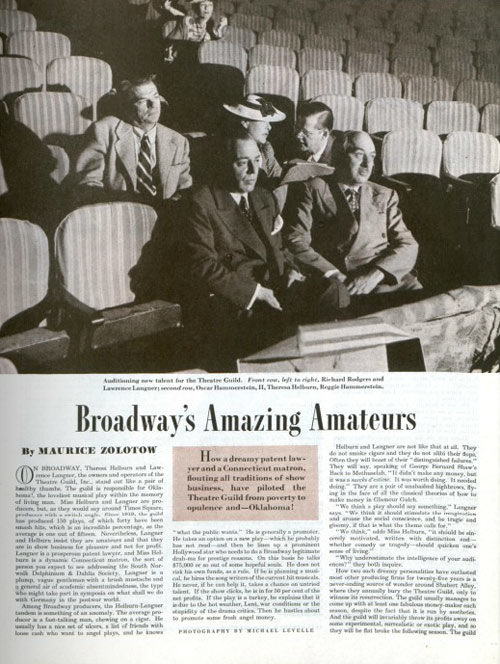
When Art Could Shock
As visitors made their way into the art exhibition at the National Guard 69th Regiment Armory in New York 105 years ago, they passed through several partitioned rooms of sensible, American pieces before reaching the “chamber of horrors” in the back left corner. This was the room featuring cubist works of Marcel Duchamp, Albert Gleizes, and Jacques Villon, among others.
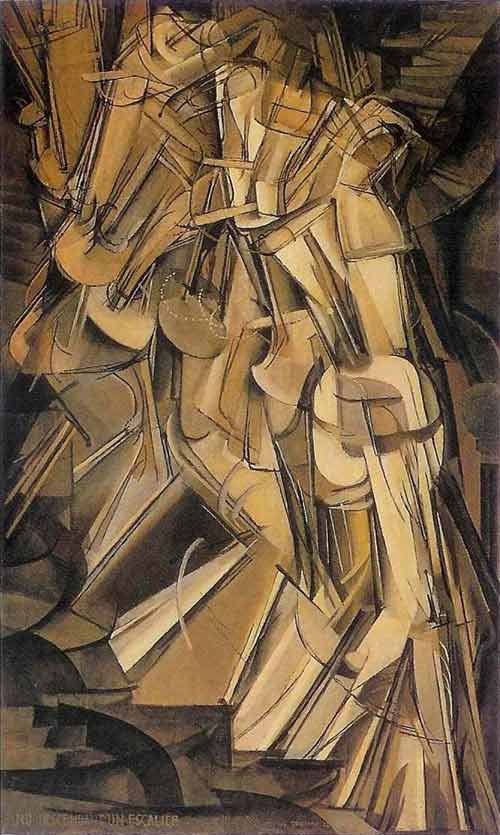
In the far corner of the cubist room was Duchamp’s Nude Descending a Staircase, No. 2. Inspired by time-lapse photography and new, avant-garde ideas of understanding time and space in art, Nude didn’t appear to resemble a nude at all, but rather an explosion. The painting delivered a cultural blow to the sensitivities of American art enthusiasts and became emblematic of the Armory Show’s legacy. American Art News lampooned the painting, offering 10 dollars to anyone who could “find the lady” in its mess of lines and shapes. Perhaps Duchamp had the last laugh when the piece sold for 324 dollars (about 7,800 dollars in today’s money).
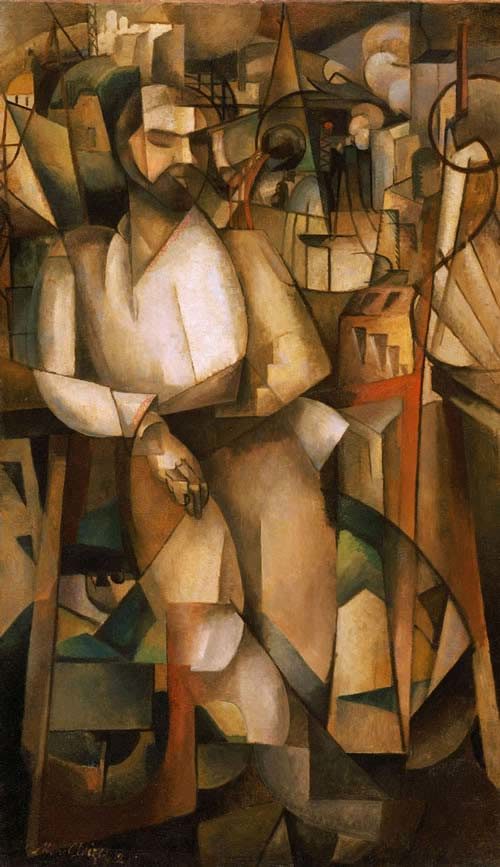
The 1913 Armory Show — also known as the International Exhibition of Modern Art — is considered the single most influential event in American modern art, completely disrupting the conservative tastes of early twentieth-century America. About 1,200 paintings were involved in the exhibition, two-thirds of which were the experimental stylings of Europe’s flourishing modernist movement.

The real fun began at the exhibition’s next stop, in Chicago, where the amount of attendees was more than double that of New York. “I assert that Matisse is an impostor,” said an art historian from the University of Chicago, “that his pictures are lacking in all elements of true art, and that the cubists are just exactly nothing.” Students from the School of the Art Institute of Chicago held a protest, burning reproductions of Matisse works on the street in effigy. The Fauvist works of Henri Matisse — particularly his nudes — were appalling to conservatives in their tendency to abstract the human form and replace skin tones with bright colors.
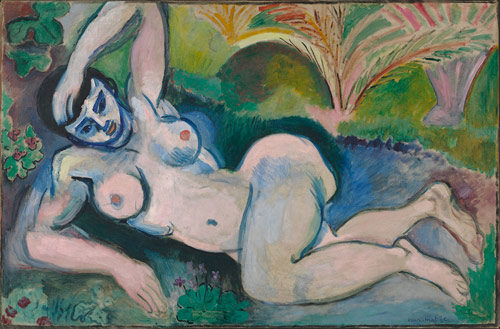
It would now be difficult for an art exhibition to elicit the same amount of shock and controversy. Dr. Jeff Hughes, a professor of art history and criticism at Webster University, says “it would be almost impossible to experience anything as new” in our current media environment “because we don’t experience it together.” In 1913, there was no television or color photography to bring these forward-thinking European movements to Americans in any significant way.
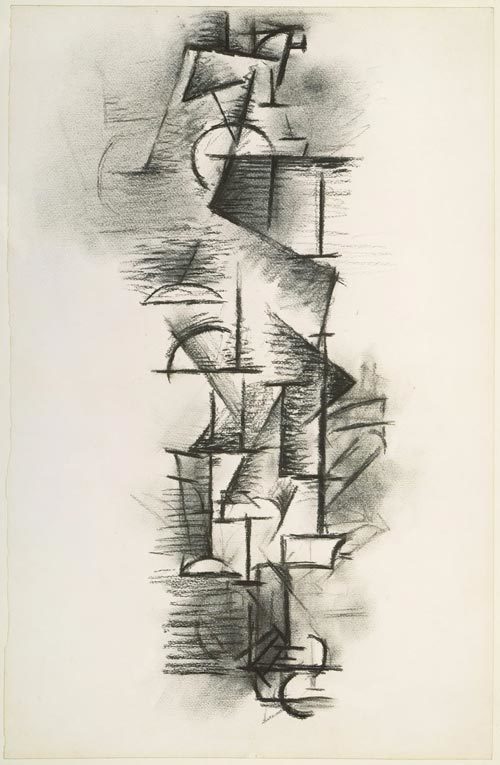
It’s no secret that the cultural conservatism of the U.S. differed greatly from Western Europe at the turn of the century, and this was reflected in the art world. Dr. Hughes attributes this to “a built-in notion in the Protestant work ethic that making art is not real work.” Part of the legacy of the Armory Show is that it was a large, international exhibition. International shows of this scope were uncommon at the time in Europe, and certainly in America, according to Dr. Hughes.
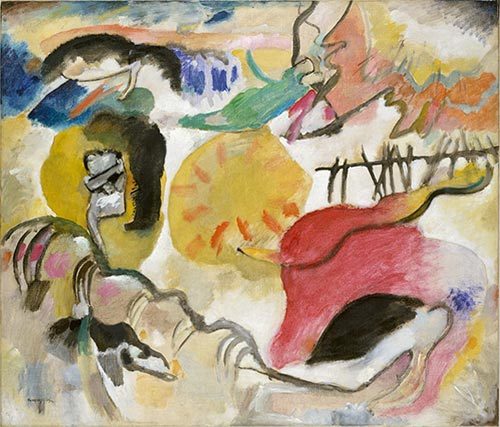
In 2014, art critic Jed Perl wrote of the show, in The New Republic, that “the conservatives lost. The avant-garde won. End of story.” Plenty of art movements since 1913 have caused a stir, like the postwar abstract expressionists or the pop art of the ’50s and ’60s. However, the Armory Show, arguably, launched an arc in American art in which these styles could have an audience.
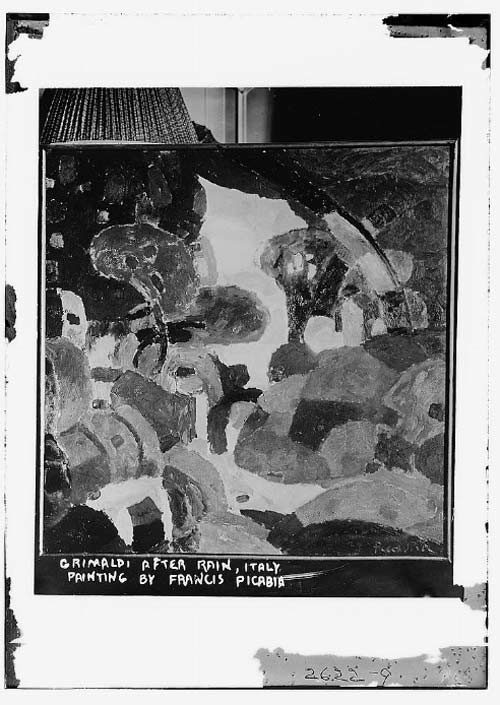
In the years after the exhibition, the country went to war, women won their right to vote, and Hollywood began churning out motion pictures. Duchamp, Picasso, and Matisse may have been an unwelcome shock, but the Armory Show was only a taste of the cultural changes to come.